This is part of my ongoing series in which I compare four translations of Final Fantasy VI with the original Japanese script. For project details and my translation notes from Day 1, see here.
Part 3: Ultros to Imperial Camp
The focus of today’s section is when the story branches into three paths. You can take them in any order you want, but I wasn’t sure what order viewers/readers would prefer for this project. Ultimately I wound up taking the Banon path first, the Locke path second, and by the end we managed to just start Sabin’s path.
The previous two articles took longer (and were more draining) to write up than I had hoped, so I’m trying to cut back on the number of things I touch on per page now. I archive the videos and translation notes, though, so who knows, maybe they’ll come in handy someday if I ever write about the game in more detail elsewhere.
Video Archive
Notes
I’ve listed some of the highlights from Day 3 below, but not all of them. I cover many more things and answer many questions during the stream, so see the Day 3 video if you want to dive even further into the game’s translations!
Mistranslated Directions
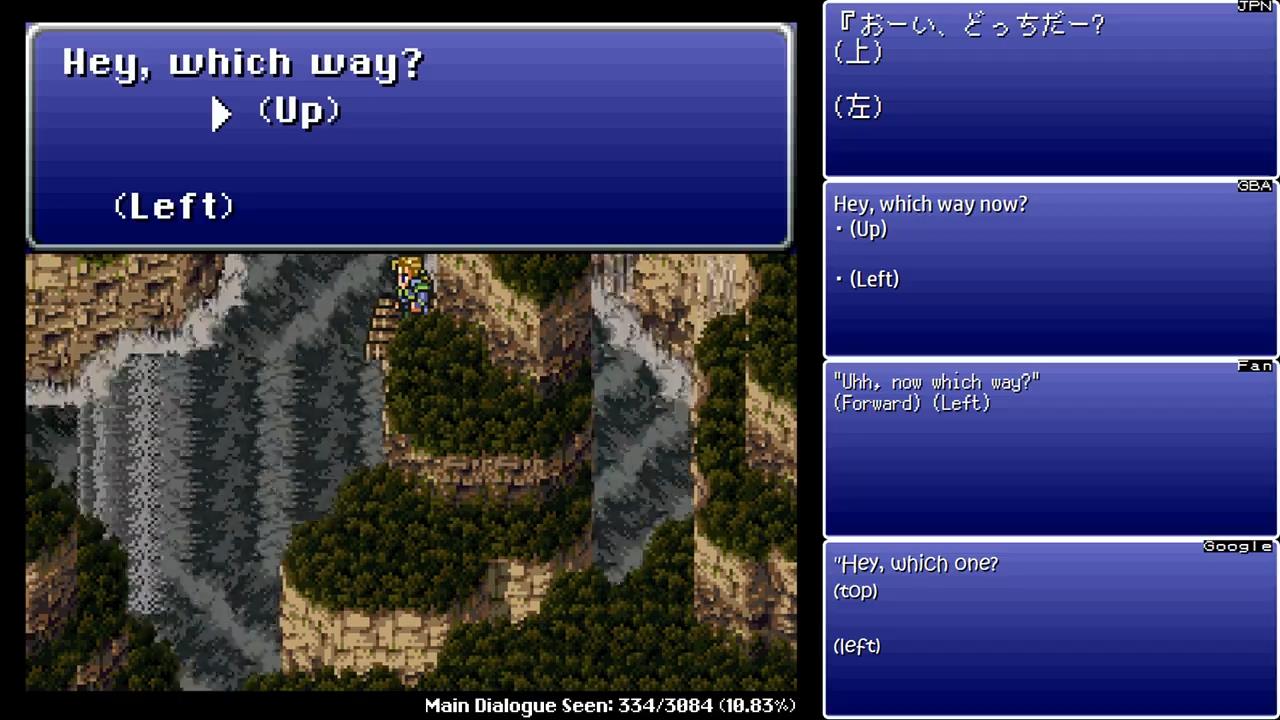
The party takes a raft and escapes from the Empire. While on the river, you occasionally get to choose which direction the raft goes.
During one of these direction-choosing parts, you’re asked if you want to go “up” or “left”. These are some of the first words you learn if you study Japanese, so it’s surprising that fan translation gets this wrong: instead of “up”, the fan translation says “forward”.
You wouldn’t think it’s a big deal at first, but as we can see in the screenshot above, the party is facing left when this message appears. So using the word “forward” would logically mean “left” here, right? But then that makes both options mean “left”… What a weird choice to change such basic words.
Getting directions wrong in translation is a surefire way to cause frustration. Getting story elements wrong in translation is one thing, but mistranslations that literally affect gameplay are some of the worst mistakes a game translator can make.
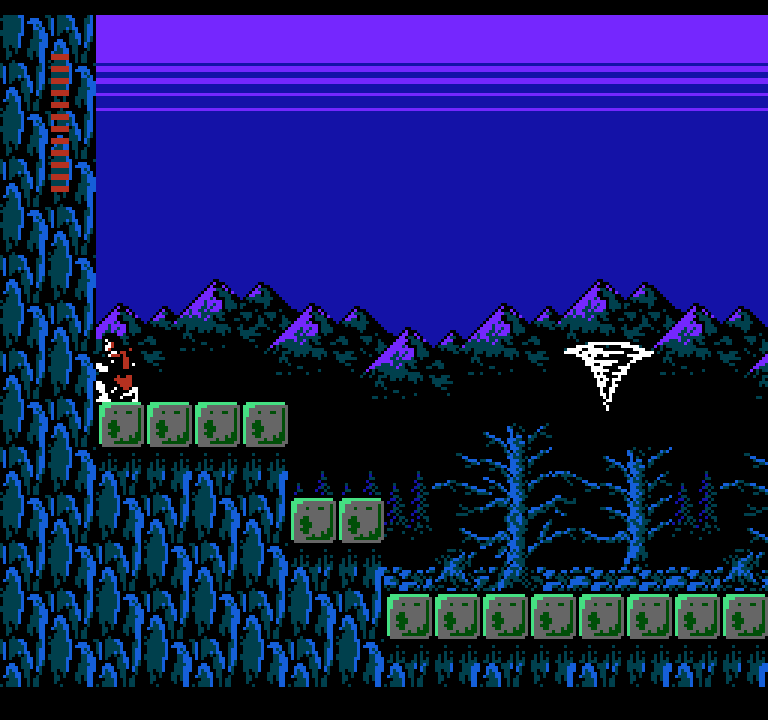
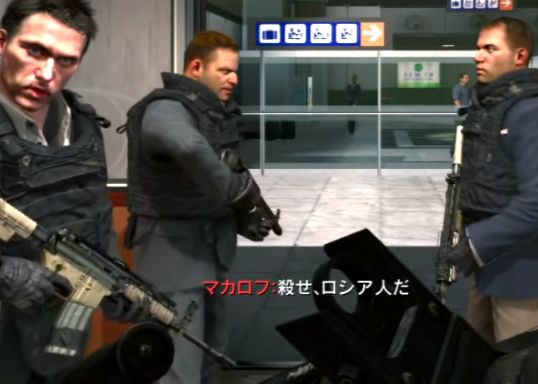
Ultros on the Menu
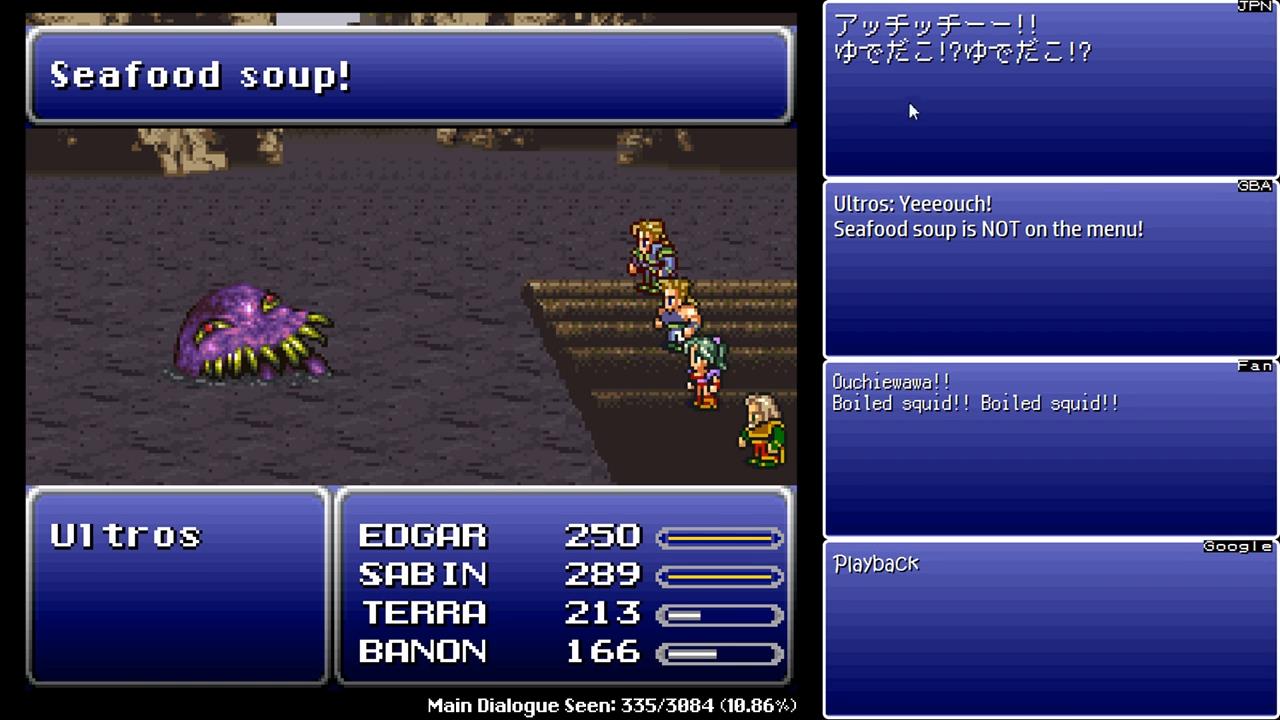
An octopus named Ultros shows up and harasses the heroes. If you use Fire magic on him, he says some silly things.
If you played the Super NES translation, you’re probably familiar with Ultros’ “Seafood soup!” line. I always took it as an aquatic-themed expression of surprise, like the generic “holy smokes!”, Inspector Gadget’s “wowzers!”, or Doc Brown’s “Great Scott!”.
It turns out that in Japanese he actually shouts, “Boiled octopus!? Boiled octopus!?” which is a common food in Japan.
With that in mind, I can see what the SNES translation is going for. The GBA translation retains this beloved line but adds clarification by appending “is NOT on the menu” afterward.
The fan translation tries to get closer to the original script but winds up missing the mark entirely – it translates the word for “octopus” as “squid” instead. What’s weirder is that Ultros also has an attack that literally translates as “Octopus Tentacle”, and the fan translation gets the word for “octopus” correct there:
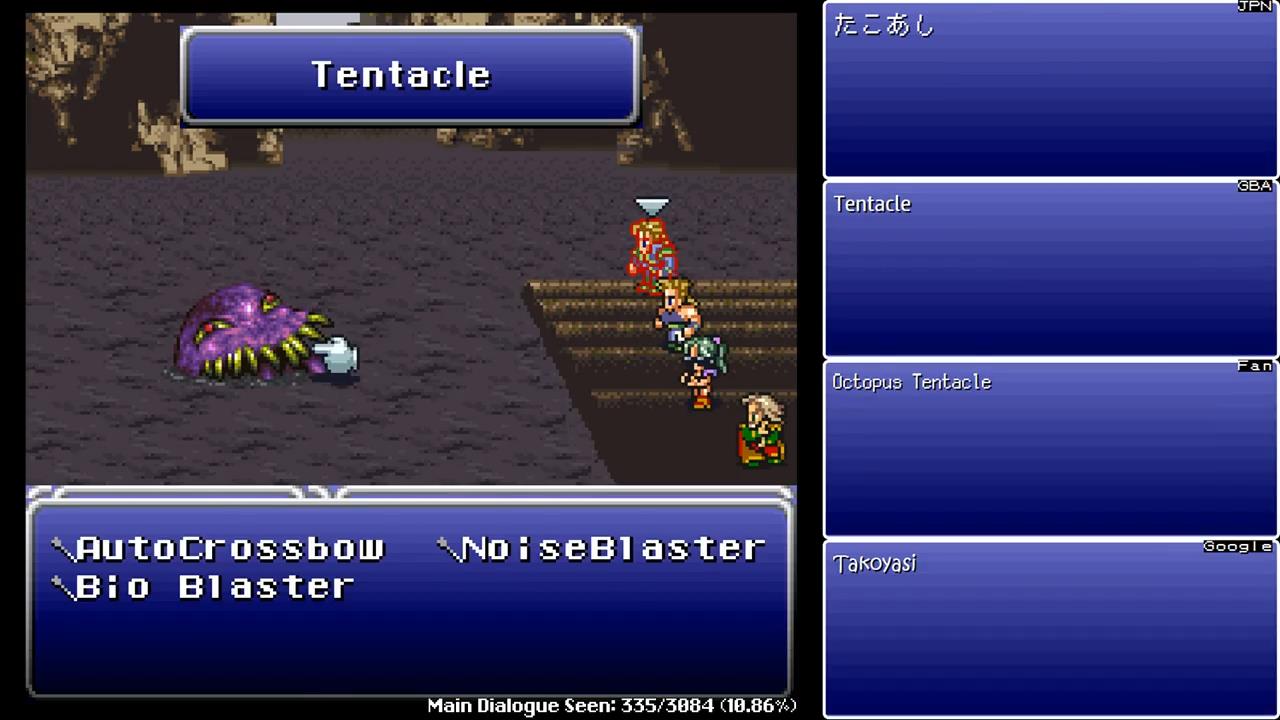
In short, the fan translation mistranslates a simple word here and handles it inconsistently at the same time.
Ultros or Orthros?
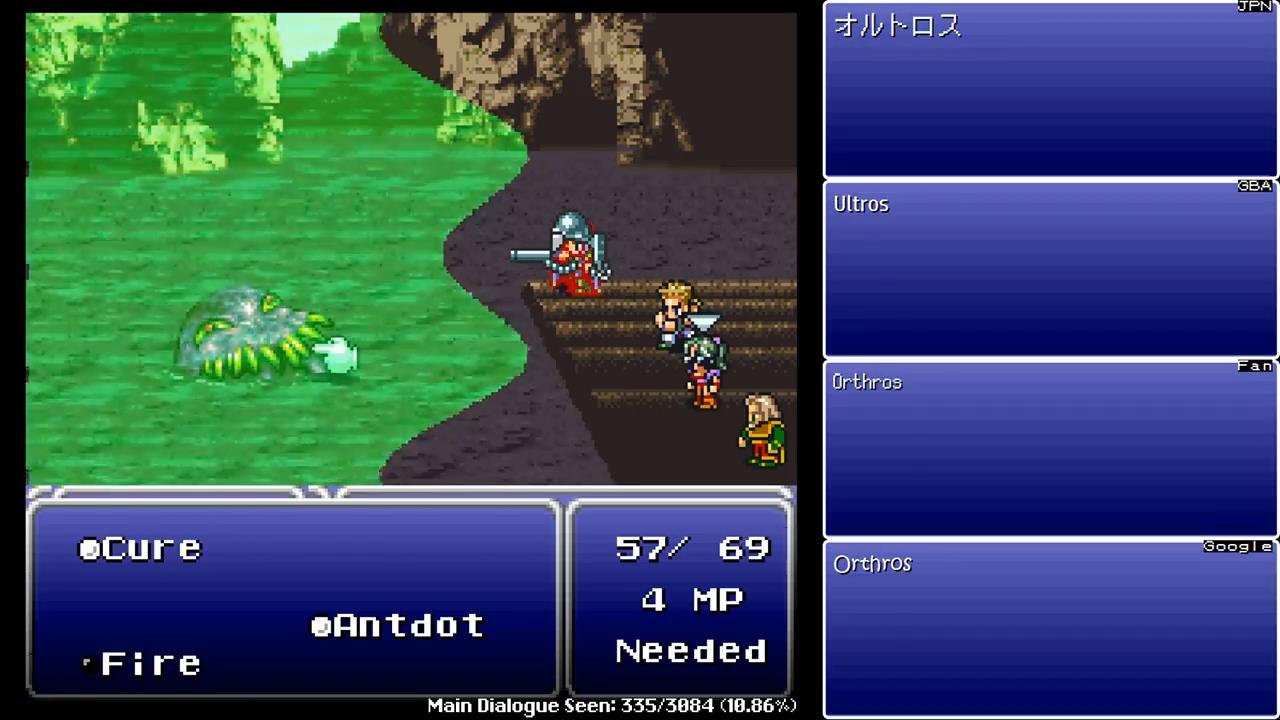
Incidentally, the character is named “Ultros” in the Super NES translation, but apparently that’s incorrect and was meant to be ”Orthros”, “Orthrus”, or “Orthus” depending on a bunch of stuff. I’m guessing this mistake was similar to the European language/mythological name problems we looked at several times back in Day 2.
Regardless, the “Ultros” name is loved by fans who grew up playing the Super NES translation, so the GBA translation keeps it the same.
Apparently Square Enix has tried to fix the name in other games whenever the character is referenced, but has been kind of back-and-forth with it. Here are a few examples I found:
Man, Ultros appears in a surprising number of games – I had no idea!
Delicious Cuties
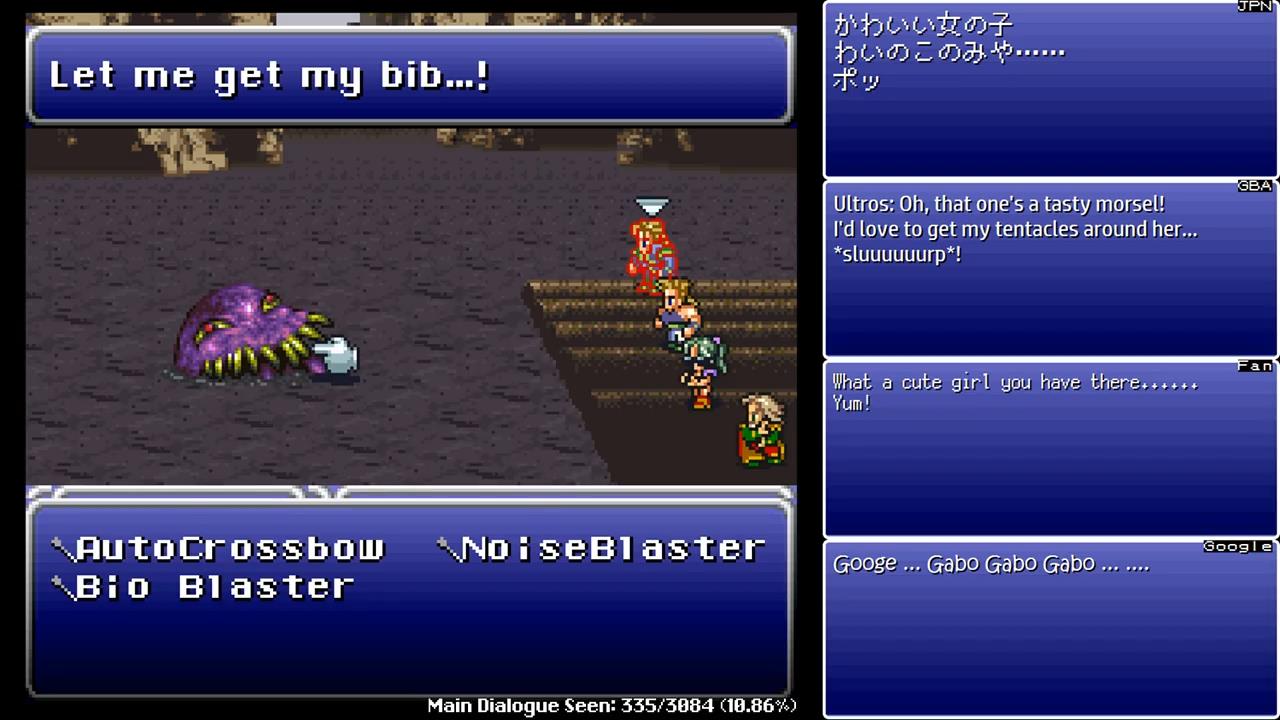
Ultros likes cute girls, and when he sees Terra he says in Japanese, “A cute girl. You’re just my type… *blush*”
The “*blush*” part is literally the Japanese sound effect word for blushing, but every translation either changes the text entirely or gets the sound effect wrong. This memorable blushing thing in Japanese is even referenced when Ultros appears in other games:
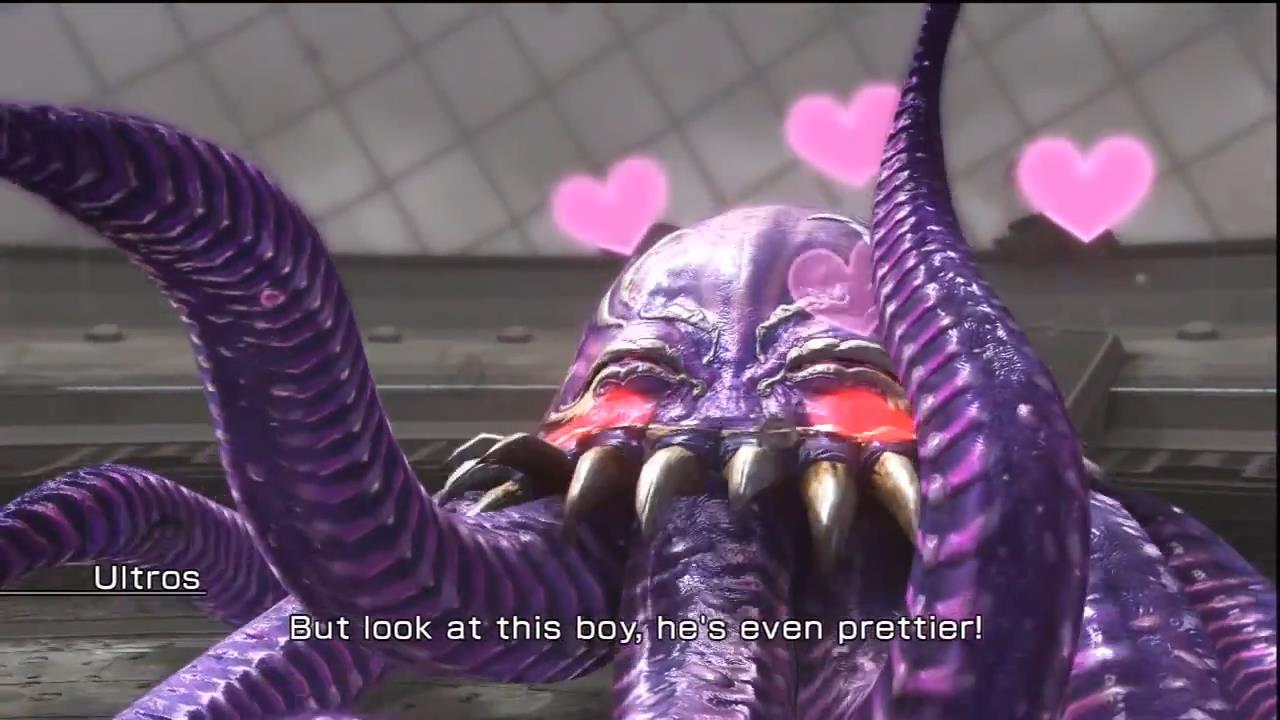
Basically, this is all to say that in the original Japanese script, Ultros just says he likes cuties and then blushes. He doesn’t make any perverted jokes about tentacles or mention bibs or slurping at all.
As a result, sound effect phrases often go mistranslated, are replaced with something completely different, or are dropped entirely. In fact, in addition to this “blush” thing, I recall this happening at least one or two more times in the fan translation during the Day 3 stream alone.
The Skilled Teacher
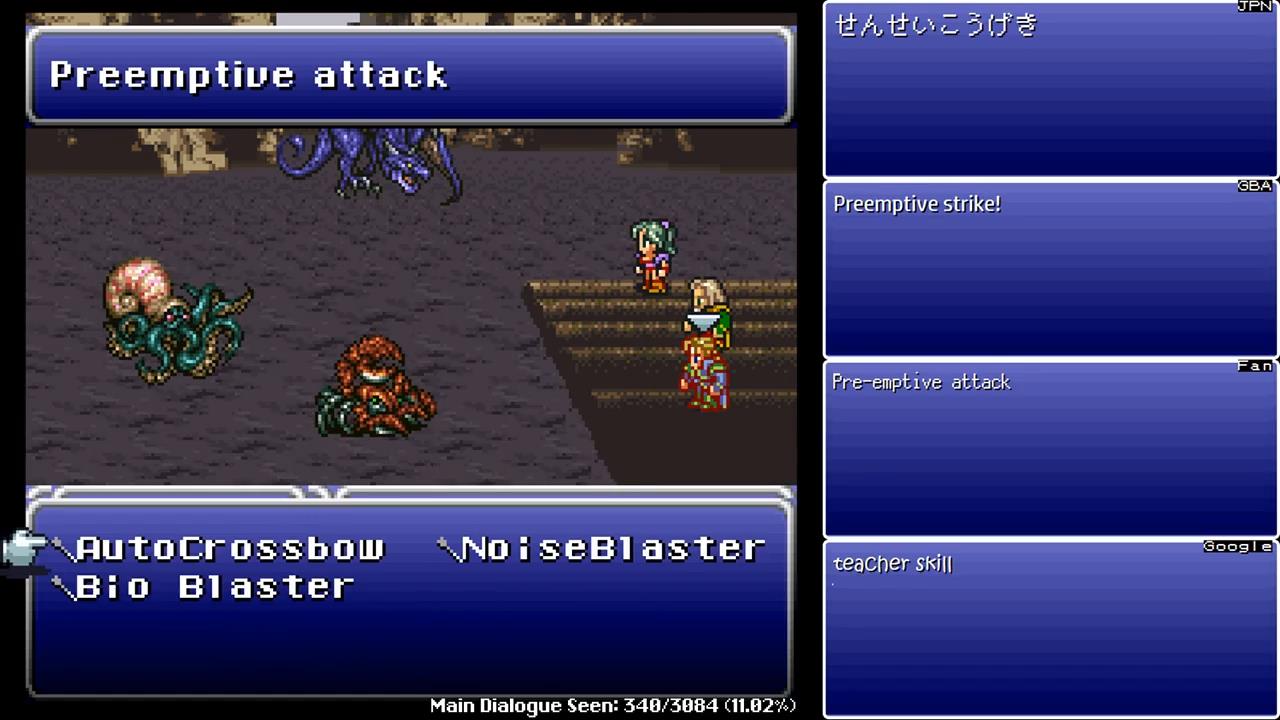
The “preemptive attack” message in Japanese is written entirely in hiragana. As we’ve learned from this fun Final Fantasy IV thing, machines struggle when game text is written this way, which is why this “preemptive attack” turns into “teacher skill” in the Google translation.
The whole word is せんせいこうげき (sensei kōgeki). Google misread the “sensei” part as meaning the teacher type of “sensei”. I’m not sure where “skill” comes from, but after writing an entire book about Google’s weird translation patterns, I’m guessing it changed the kōgeki part to a slightly different Japanese word and then tried to translate that into English.
Banon’s Chocobo Glitch
The chat reminded me to head south to the Chocobo stable before taking the party into Narshe. The programmers forgot to give Banon a full set of riding sprites, so it looks glitchy when you put him at the head of your party and ride a Chocobo. For fun, I thought I’d share what it looks like here:
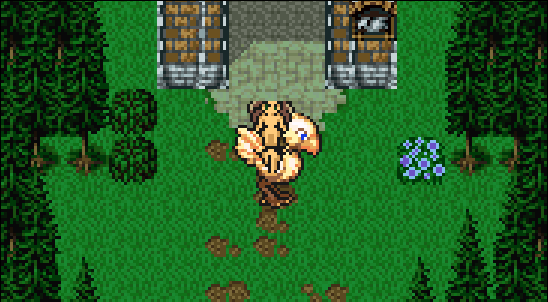
Speech Personalities
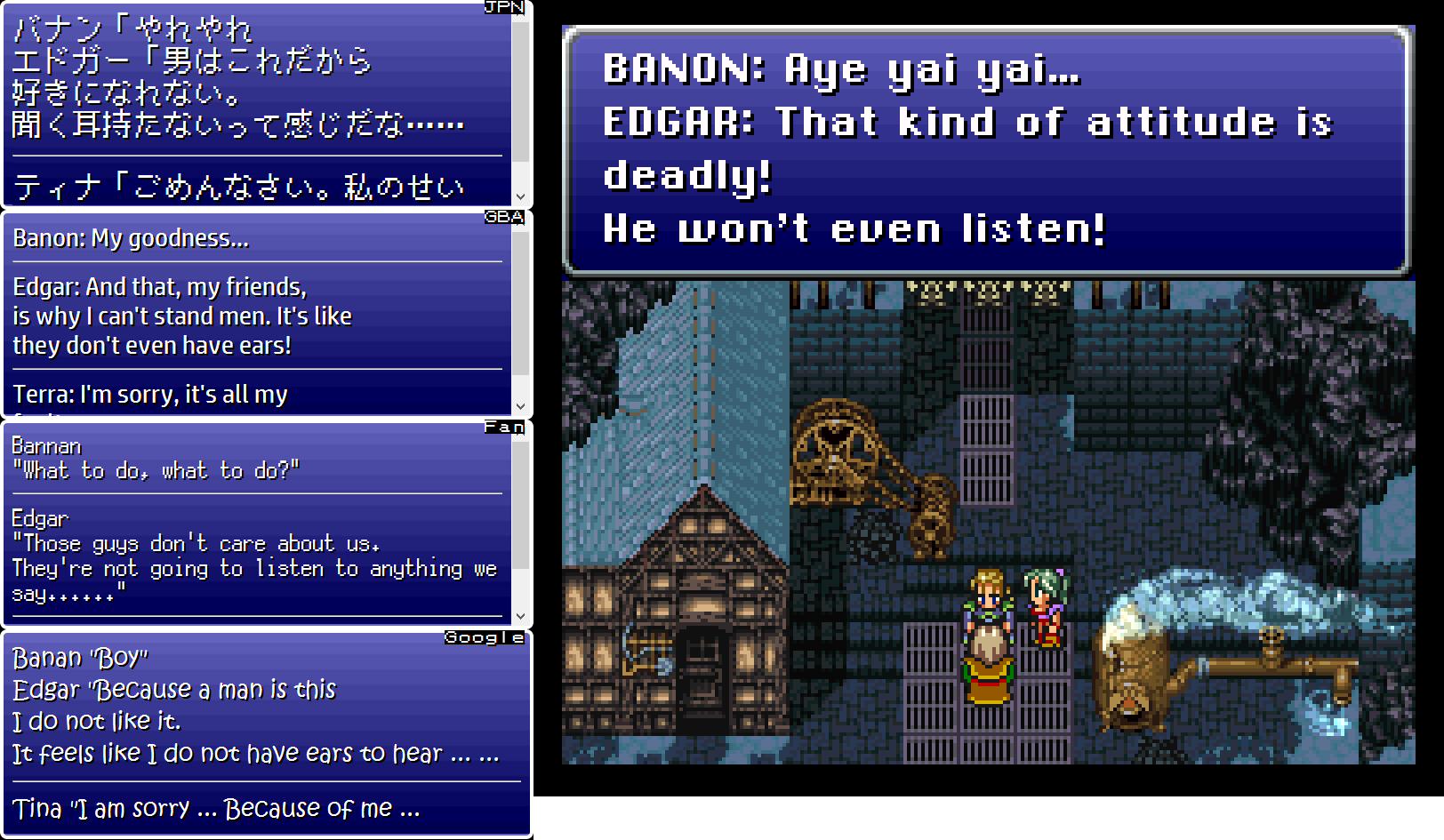
It’s always difficult to explain this sort of thing, but in Japanese, Banon’s speech style evokes a certain sort of character image. The Super NES translation gives him lines like “Aye yai yai” that don’t really match the way he “sounds” in Japanese. Of course, this is always a difficult topic to dissect, and whether or not a character should have a matching “feel” between languages is sometimes a matter of personal taste – both the localizer’s and the player’s.
In any case, the GBA translator felt similarly about Banon’s character feeling off in the original script and fixed things accordingly.
Desperation Attacks
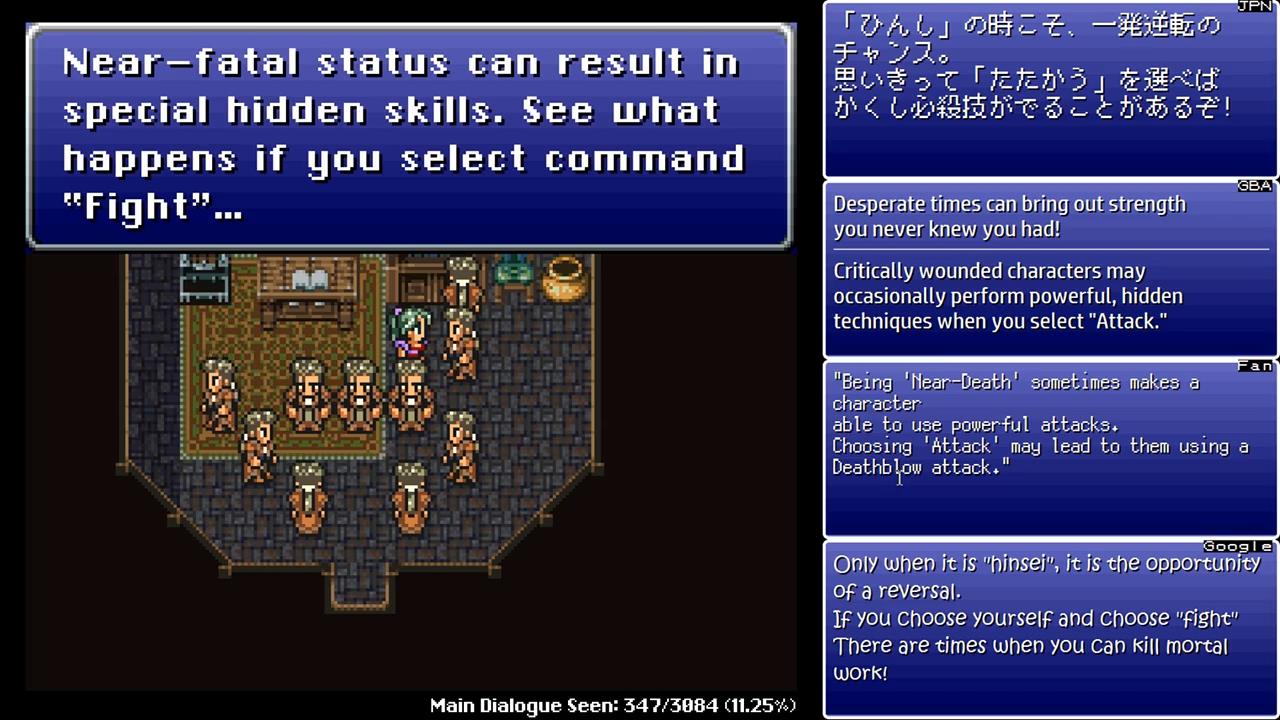
Final Fantasy VI has a neat mechanic where a character might unexpectedly unleash a super-powerful desperation attack if their HP is critically low. This tutorial guy tries to explain this, but the Super NES translation makes it a little less clear. So I actually never knew about these secret desperation attacks until I downloaded a giant FAQ off of a relative’s AOL-connected computer in the late 1990s.
The Japanese translation spells it out more clearly, and the GBA translation rewrites the hint entirely with much greater clarity than the SNES translation.
On a different note, we saw in Day 2 that Sabin’s Blitz techniques are called “Deathblows” in the fan translation… but the fan translation uses the same word here. That almost suggests that every character can do a Blitz technique if their HP is low enough, but that’s not the case at all. This is arguably another example of terminology consistency backfiring on the fan translation team, but in a different way.
Google Gets it Right
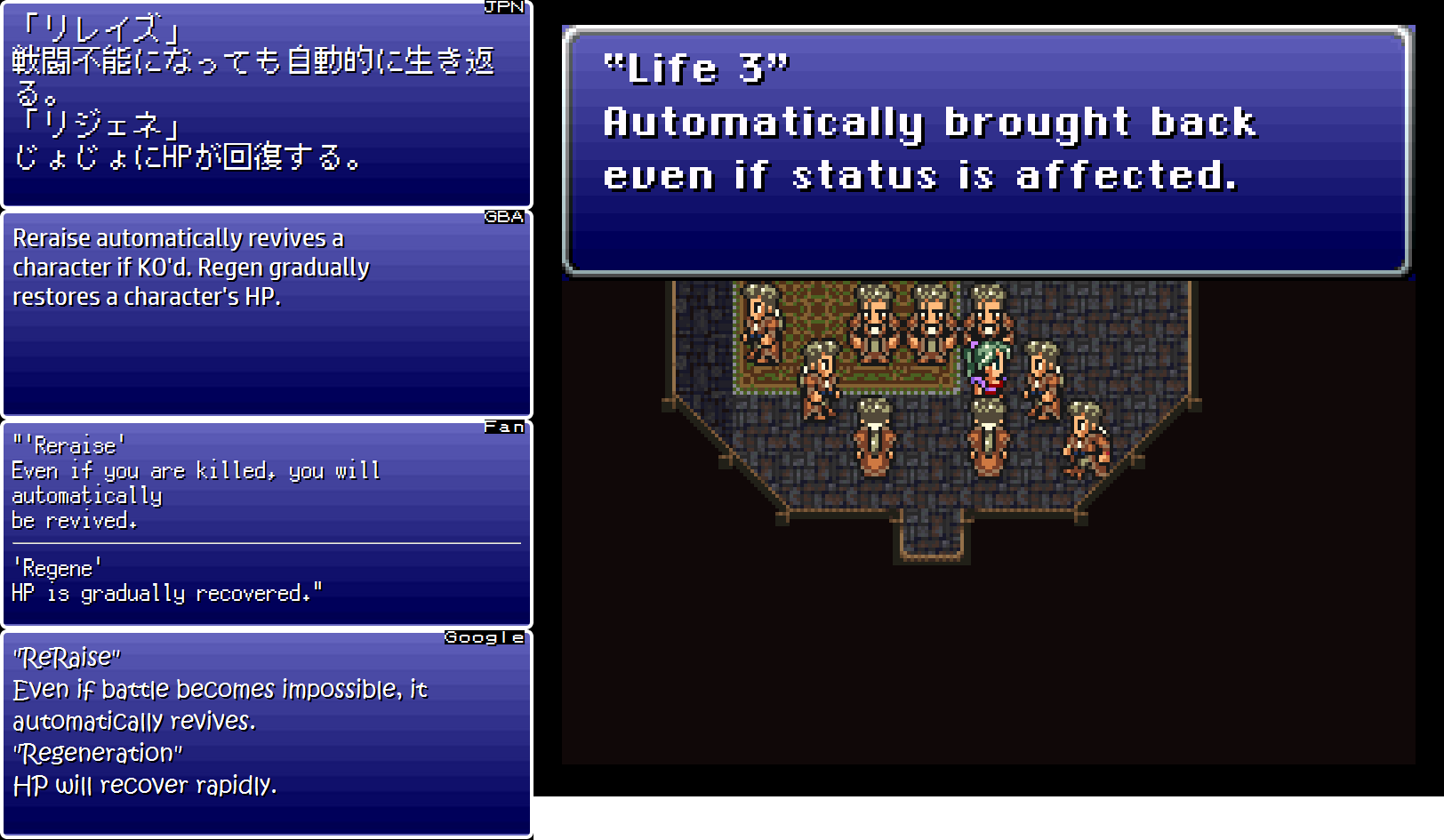
This tutorial guy explains that there’s a magic spell that automatically revives party members if they get knocked out of battle.
The wording in the Super NES translation is really weird, though: “Automatically brought back even if status is affected.” What does that even mean?
In contrast, the GBA translation, the fan translation, and the Google translation more clearly explain what the spell does.
Which One is Right?
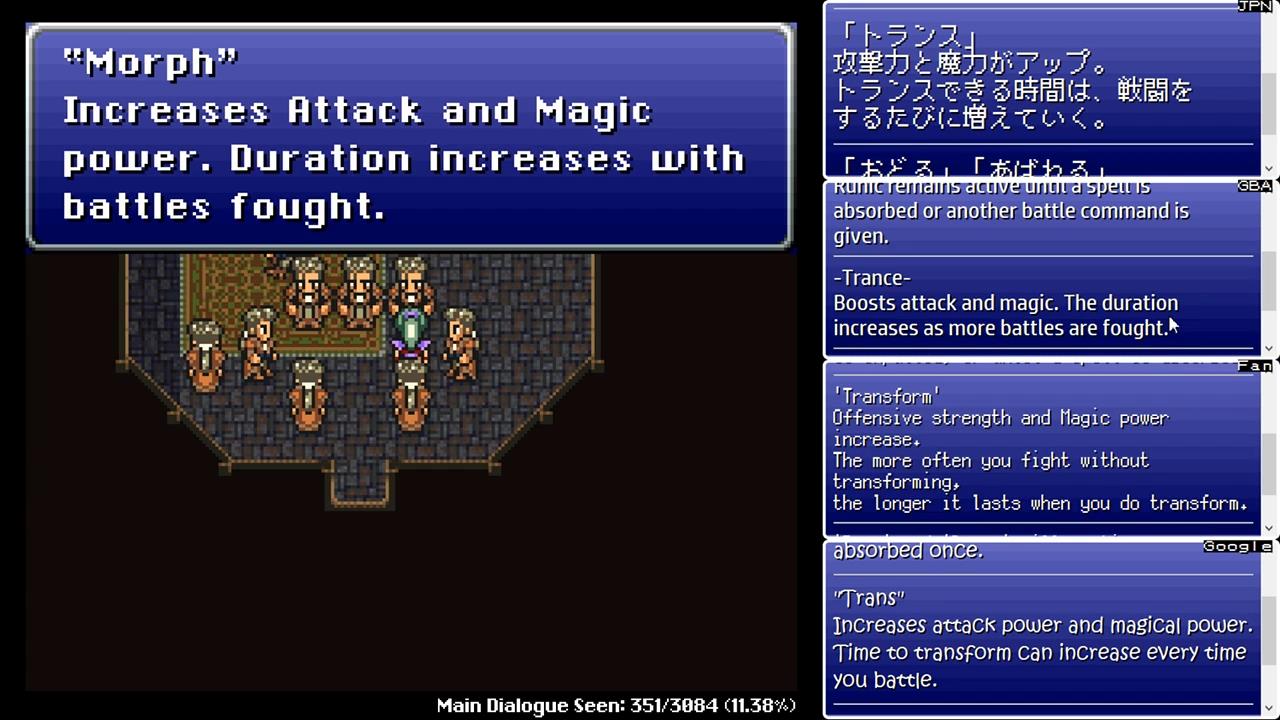
Later on, Terra gets the ability to transform into an Esper-like creature. In Japanese, this ability is called something like “Trans” or “Trance”, and the transformation only lasts until an energy bar depletes. This tutorial guy explains how it works by saying:
Increases attack power and magic power. The amount of time you can Trans/Trance increases each time you do battle.
The Super NES and GBA translations seem to say the same thing… but the fan translation says something different:
The more often you fight without transforming, the longer it lasts when you do transform.
I would assume that Final Fantasy VI super fans would probably know the game mechanics in and out, so my first instinct was to believe the fan translation here.
But viewers in the stream chat argued that it’s technically different than that: apparently the amount of time increases each time the party gains AP in battle. But as far as I know, you can’t not get AP after every battle by the time you get this ability. So in a way, the original script and official translations aren’t wrong, nor is the fan translation wrong.
What a weird phenomenon! I’m hoping readers familiar with the game’s coding can chime in with more details. Also, does the power maybe work differently in some versions?
This Typo Sure is Somethihg
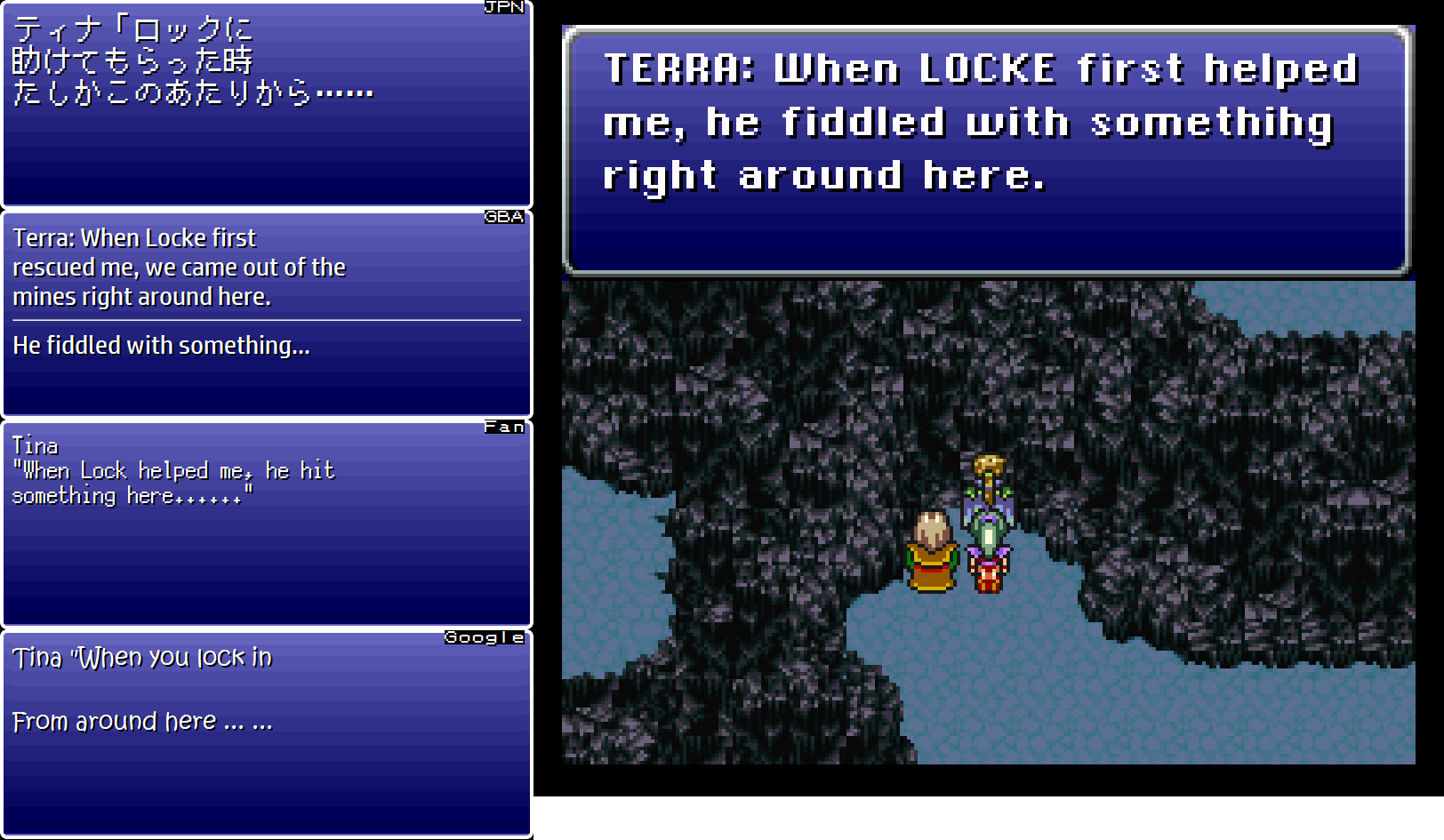
I don’t think I ever noticed this typo in the Super NES script before. I almost missed it during this stream, in fact!
Anxiety Goes Berserk
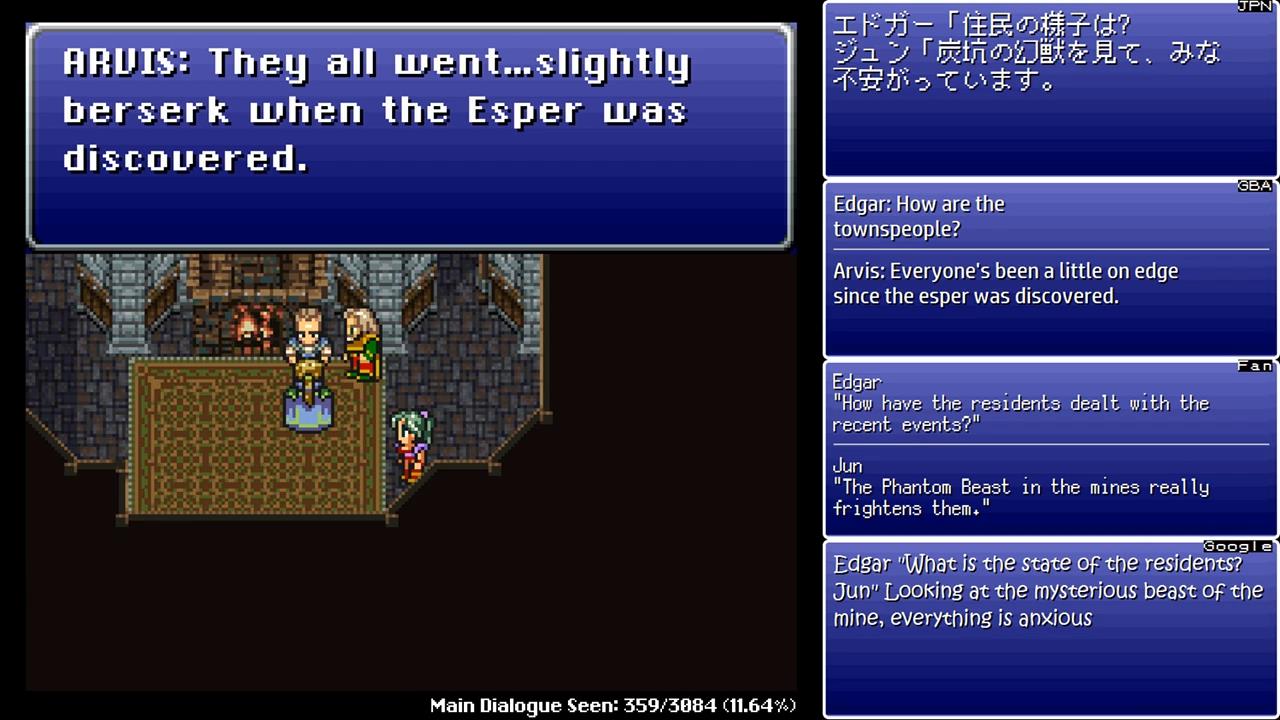
This Arvis guy (who’s named Jun in Japanese) says that everyone in town went “slightly berserk” when the Esper in Narshe was discovered. This always felt kind of odd to me, and now I know why: he actually says everyone “feels uneasy/anxious” in Japanese. That’s quite a difference in attitude!
The GBA translation stays in tune with the Japanese line, while the fan translation goes with “frightened” instead, which feels similar to the SNES translation.
Get the Shovel
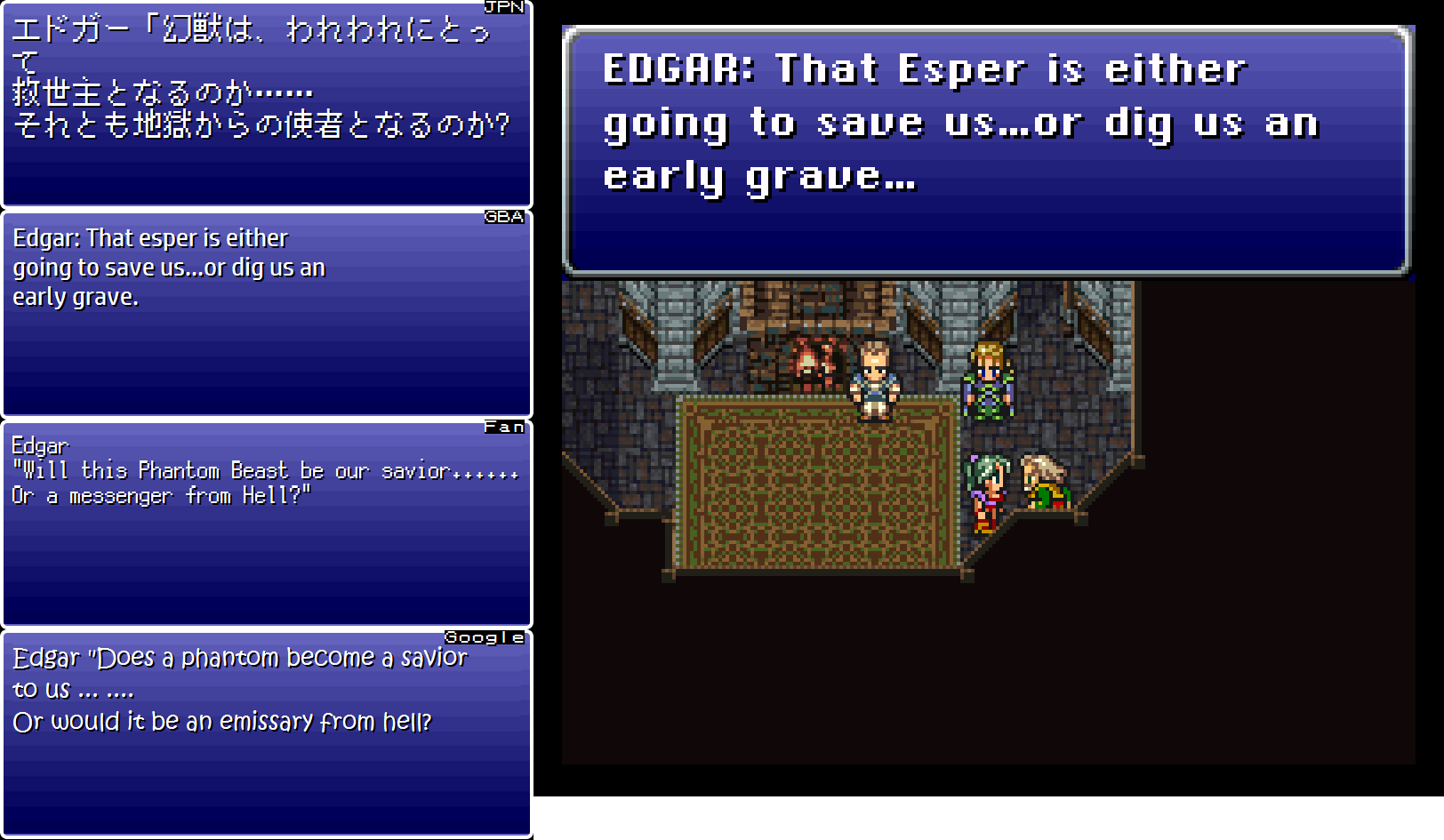
In Japanese, Edgar says something like, “Will the Esper end up being our savior… or an emissary/messenger from Hell?”
This was rephrased in the Super NES translation as, “That Esper is either going to save us… or dig us an early grave…” I actually really like this localization choice, which I assumed was changed partially because a straightforward translation sounds awkward in English but also because of the religious references.
It seems the GBA translator felt the same way, because the GBA translation uses the exact same text, even down to the text formatting.
Violent Treasure Hunter
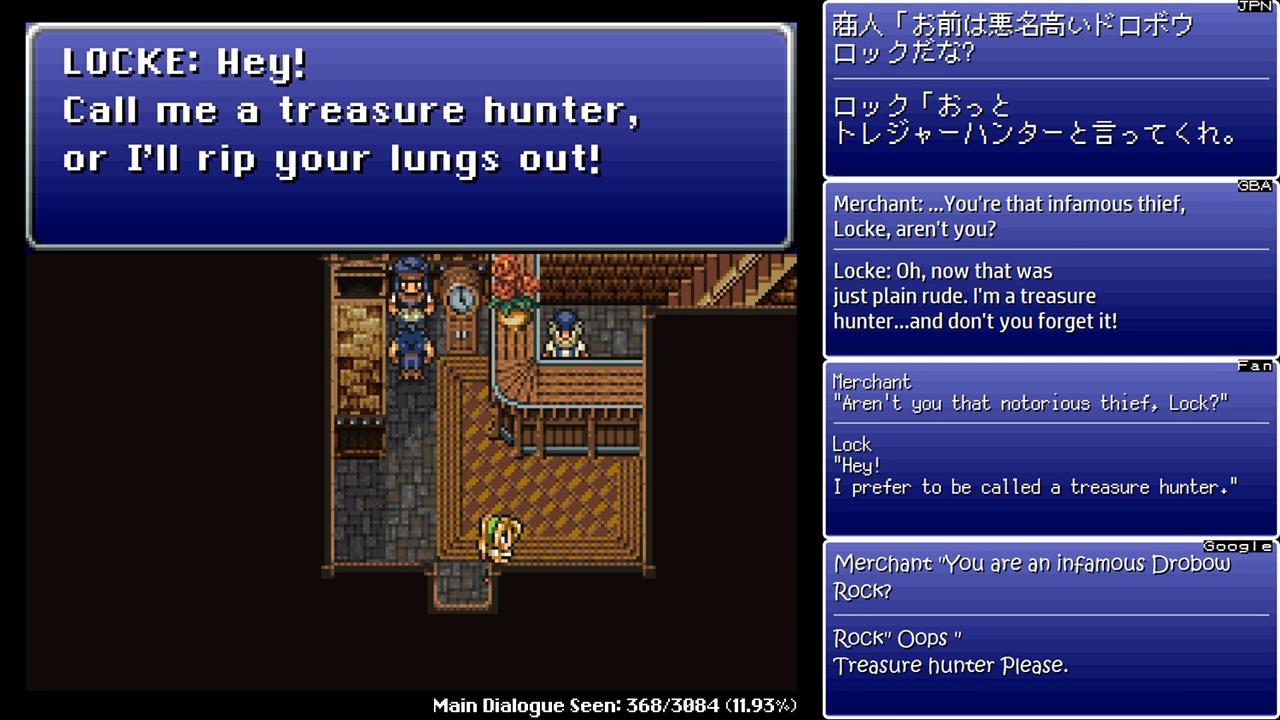
The Terra/Edgar/Bannon scenario is over, so we switch to Locke’s scenario next. He has to steal clothes from people to get around town, and occasionally he yells at merchants who call him a thief.
In the Super NES translation, Locke yells angrily in response, “Hey! Call me a treasure hunter, or I’ll rip your lungs out!”
The original Japanese line is far less violent, though: “Whoa, now. Call me a treasure hunter.”
I’m surprised the Super NES translation actually added violent-sounding text like this. The GBA translation tones things back down, and we can see in the fan translation and machine translation that the original Japanese line didn’t involve any lung-ripping.
A Rhyming Thief
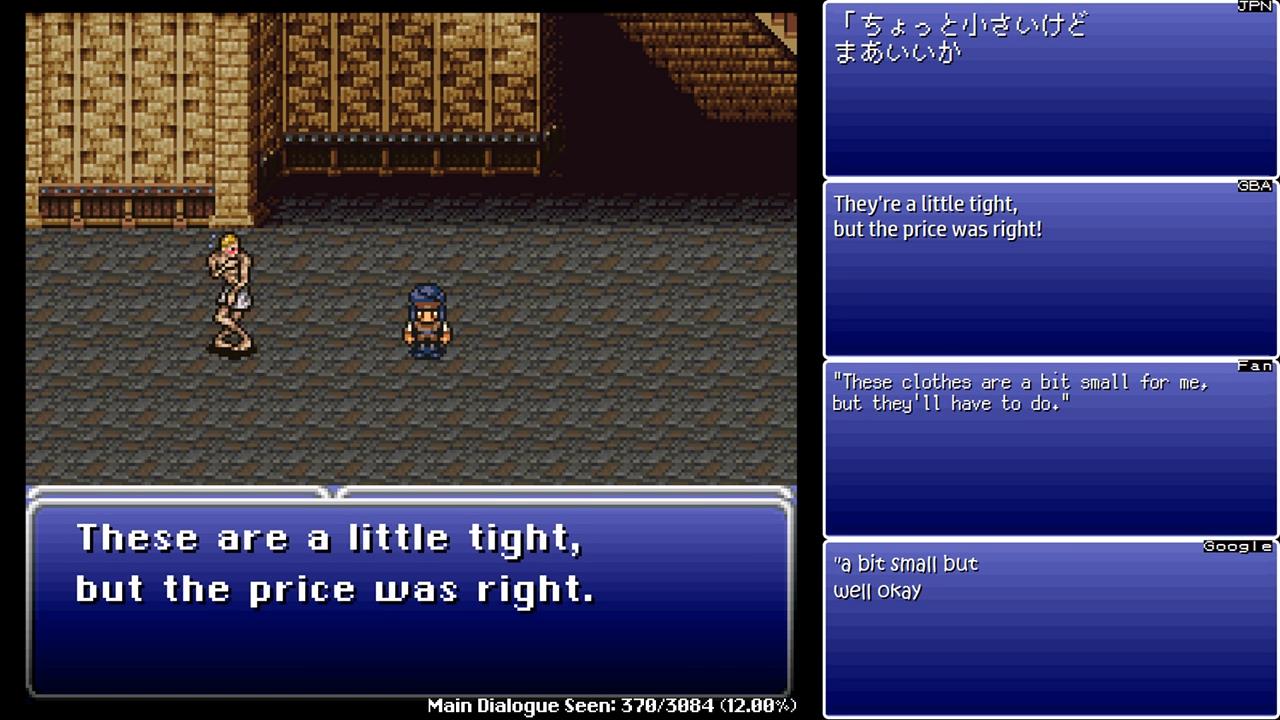
After Locke steals a merchant’s clothes, he says in Japanese, “They’re a little small, but I guess they’ll do.”
The Super NES translation slightly changes the line and makes it a snappy, memorable little line that fans remember to this day: “These are a little tight, but the price was right.”
I definitely feel that this is a case of a localization surpassing the original text, and the GBA translator felt the same way too.
Don’t Stop the Rhymes!
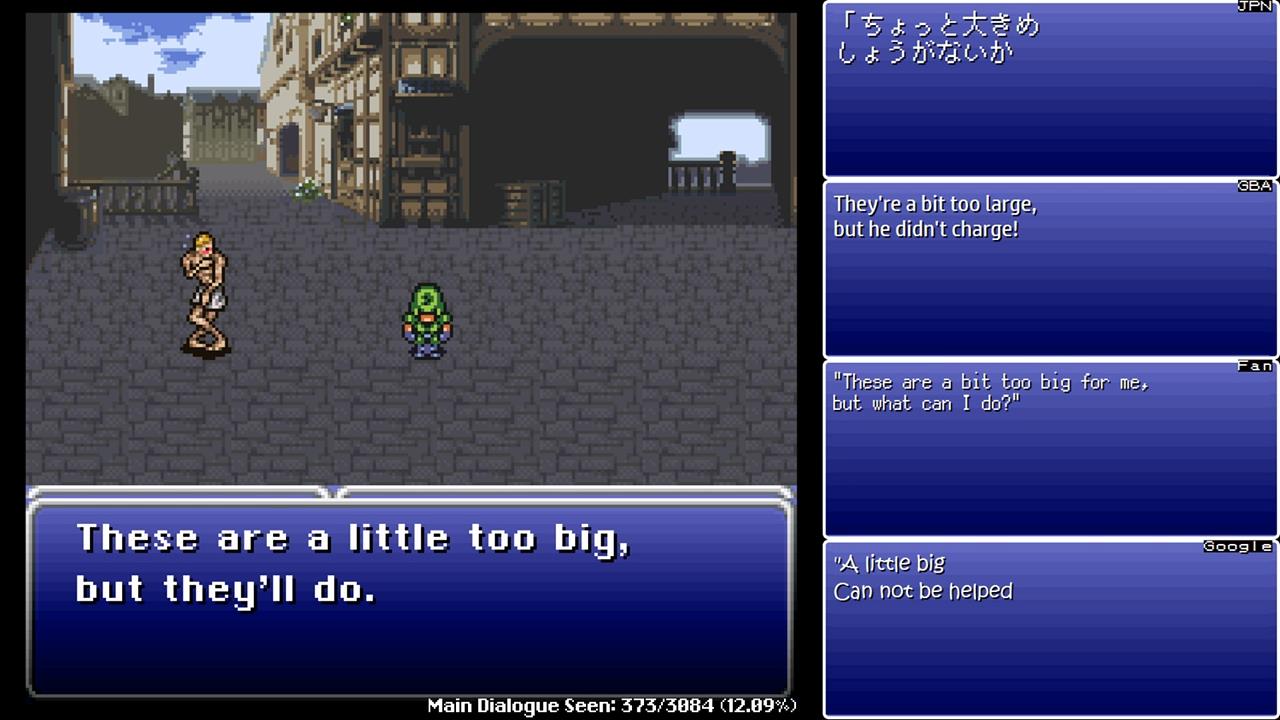
Similarly, when Locke steals a soldier’s clothes, he says in Japanese, “They’re a little big, but it’s not like I got much of a choice.”
The Super NES translation doesn’t have a cool little rhyme here though. This time, it’s a straightforward translation: “These are a little too big, but they’ll do.”
The GBA translator really liked the rhyme quote from before and changed things around so that this line works similarly too: “They’re a bit large, but he didn’t charge!”
It’s such a minor thing, but you can really tell that the GBA translator enjoyed certain aspects of the Super NES translation and tried to pay it respect whenever an opportunity presented itself.
Unfunny Murderers
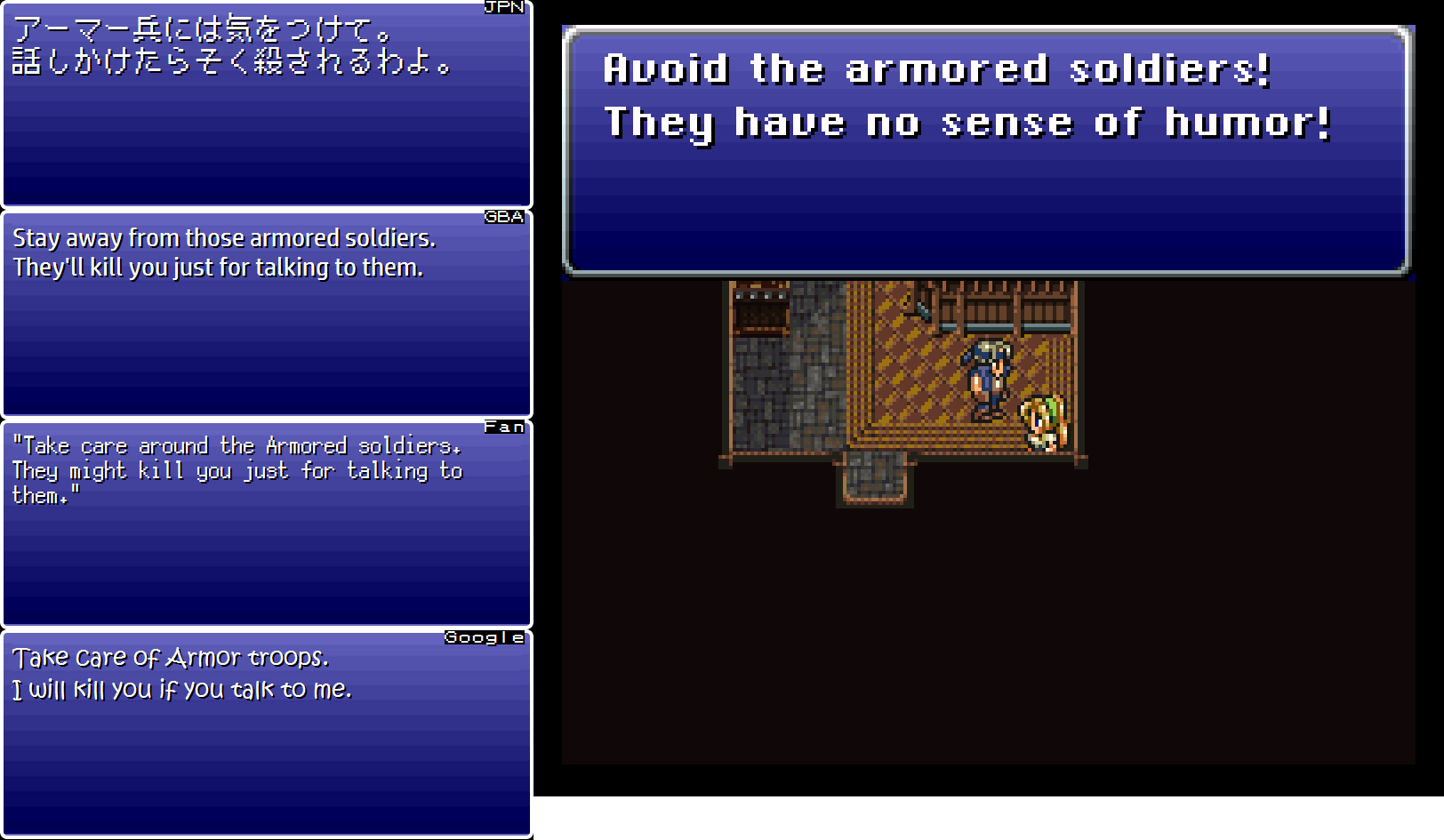
The town of South Figaro is crawling with Imperial soldiers. This lady warns Locke to avoid the ones in the Magitek armor.
In Japanese, she says, “Watch out for the armor soldiers. They’ll kill you on the spot if you talk to them.”
In the Super NES translation, this violent line about killing was toned down: “Avoid the armored soldiers! They have no sense of humor!”
The GBA translation and fan translation retain the killing reference. The machine translation sentences Locke to death.
Merchant Hints
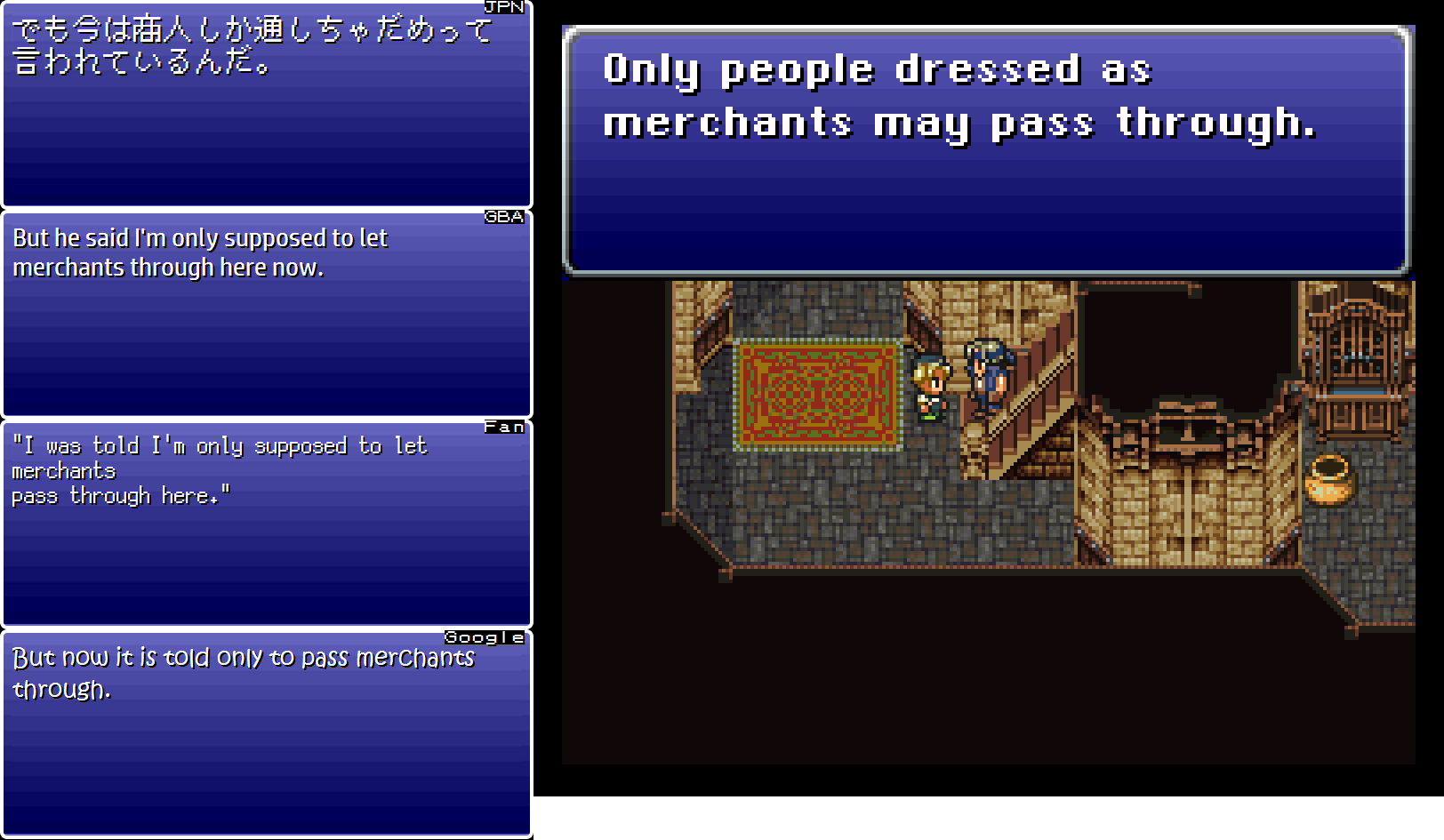
This boy blocks the way ahead. In Japanese, he says, “But he said I’m only allowed to let merchants through now.” This is supposed to nudge players into realizing, “Oh, I wonder if I can steal merchants’ clothes!”
The Super NES translation makes this vague hint a little more obvious: “Only people dressed as merchants may pass through.” The translator added this “dressed as” part to spell out what you need to do a little more clearly.
The GBA translation, the fan translation, and the machine translation all stay with the original Japanese hint and don’t suggest a change of outfit.
Lost FF2 Reference
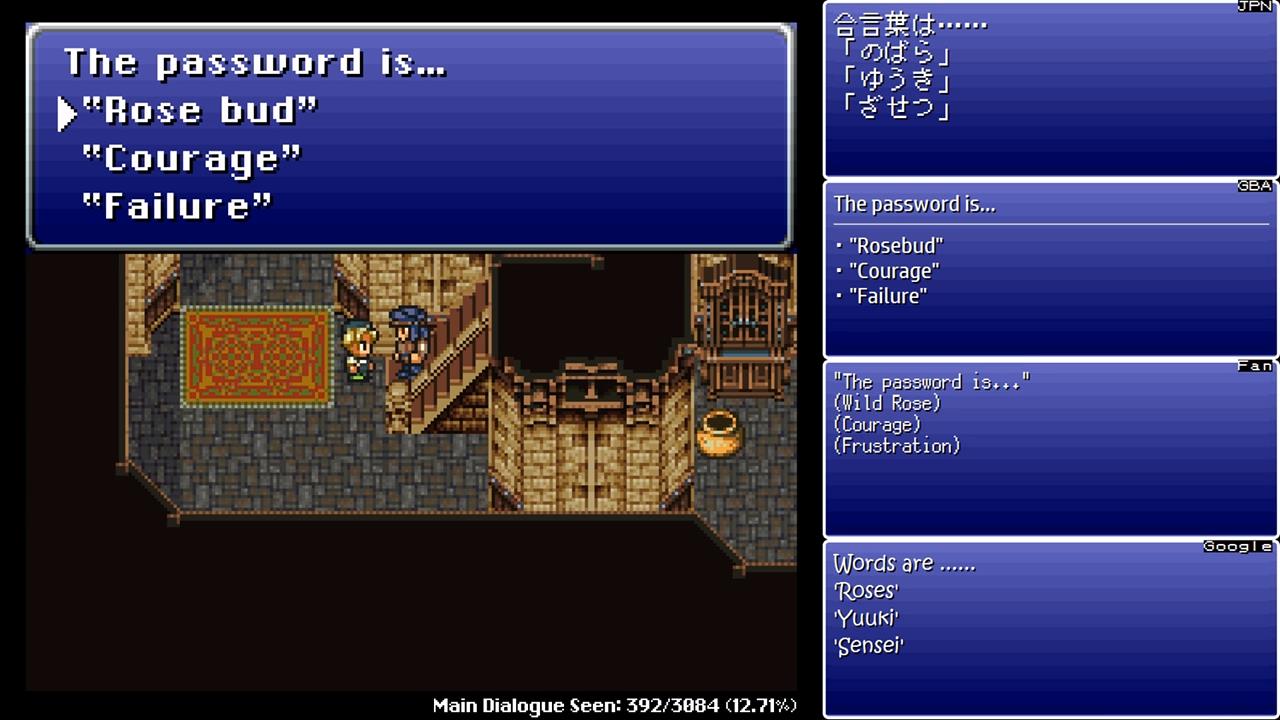
Once Locke does get a merchant’s outfit, the boy then asks for the password. As far as I know, you have to guess what the password is.
In the Super NES translation, the choices are “Rose bud”, “Courage”, and “Failure”. I always assumed that this “Rose bud” thing was referring to the movie Citizen Kane – but, of course, as a youngster at the time I only knew of it because of cartoons like The Real Ghostbusters and Animaniacs.
Anyway, looking at the Japanese version, I see that the first password is actually のばら (nobara), which means “wild rose”. And luckily I know just enough about old Japanese games to recognize that this was the important password used in the Famicom version of Final Fantasy II:
This second Final Fantasy game never got an English release back then, so English-speaking players – and maybe the translator himself – never would’ve recognized the “Wild Rose” password anyway. But I’m guessing that the translator saw the word “rose” in there and by pure stream of consciousness decided to go with “Rose bud”, which would have significance to players.
Tone Down the Violence, Please
General Celes has been captured and is being held in a small room underground. Some guards punch her and chain her up to a wall in the original releases of the game, but this scene was altered in the GBA version. The guards no longer hit her, and she doesn’t get chained up.
These torture-like elements were most likely removed to adhere to Japan’s recently established game rating system. For some reason, I vaguely recall that some specific incidents of violence happened around the same time as the Japanese GBA game’s release, and that they possibly prompted this change. Like national news about some student tortured another student or something? I can’t remember. It’s been so long ago and I didn’t really pay attention at the time, so I might be mixing it up with a different change made to a completely different Japanese game, though.
Anyway, the English version of the GBA release also leaves these acts of violence out of the Celes intro scene.
Celes’ Intro
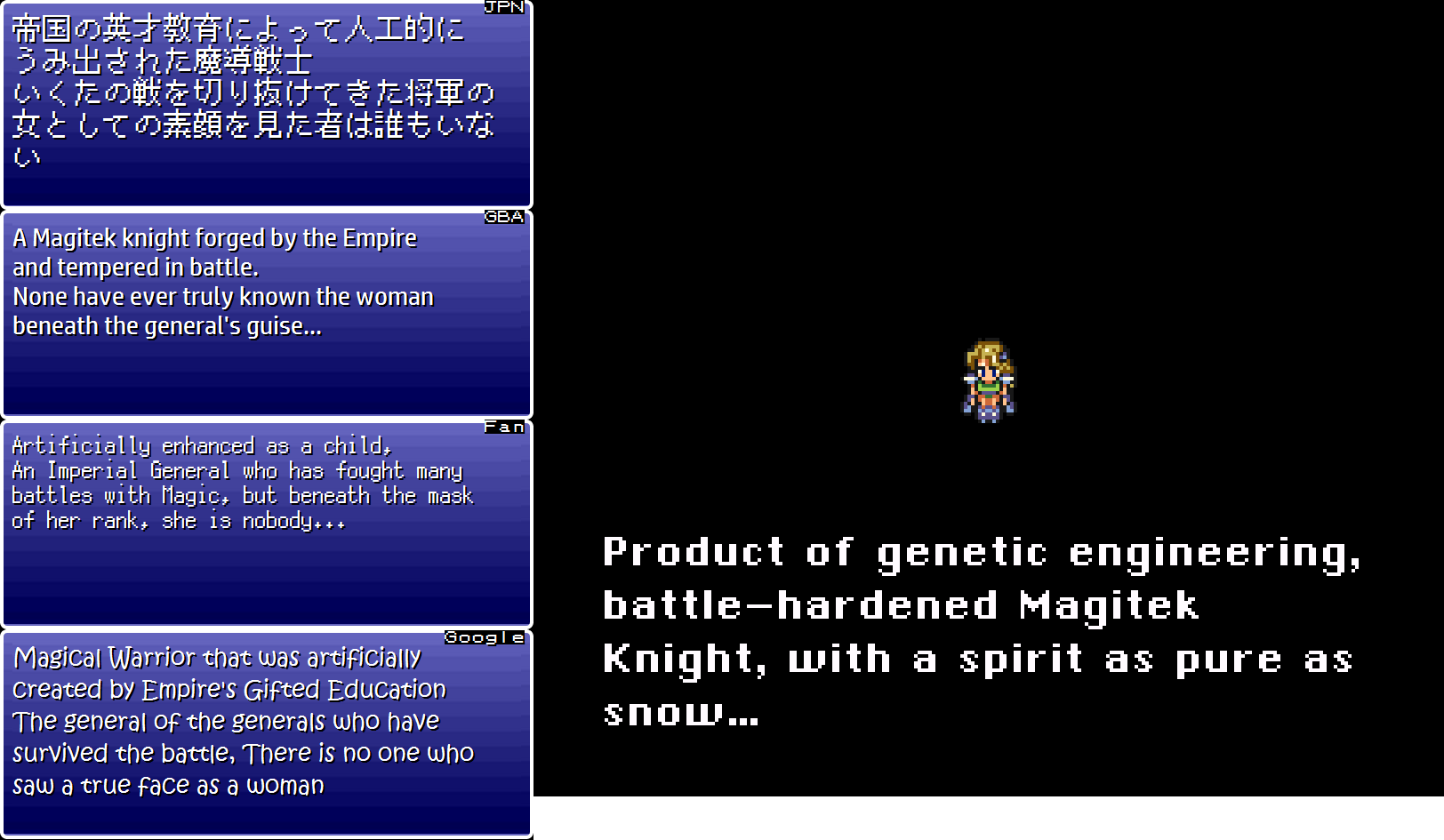
Right before you get to name Celes, a little description about her pops up. In the Super NES translation, it says that she’s the “product of genetic engineering”. In the Japanese script, however, there’s nothing about genetic engineering at all. Instead, the Empire simply gave her the kind of special education and/or upbringing that gifted children get.
Write Out the Killing
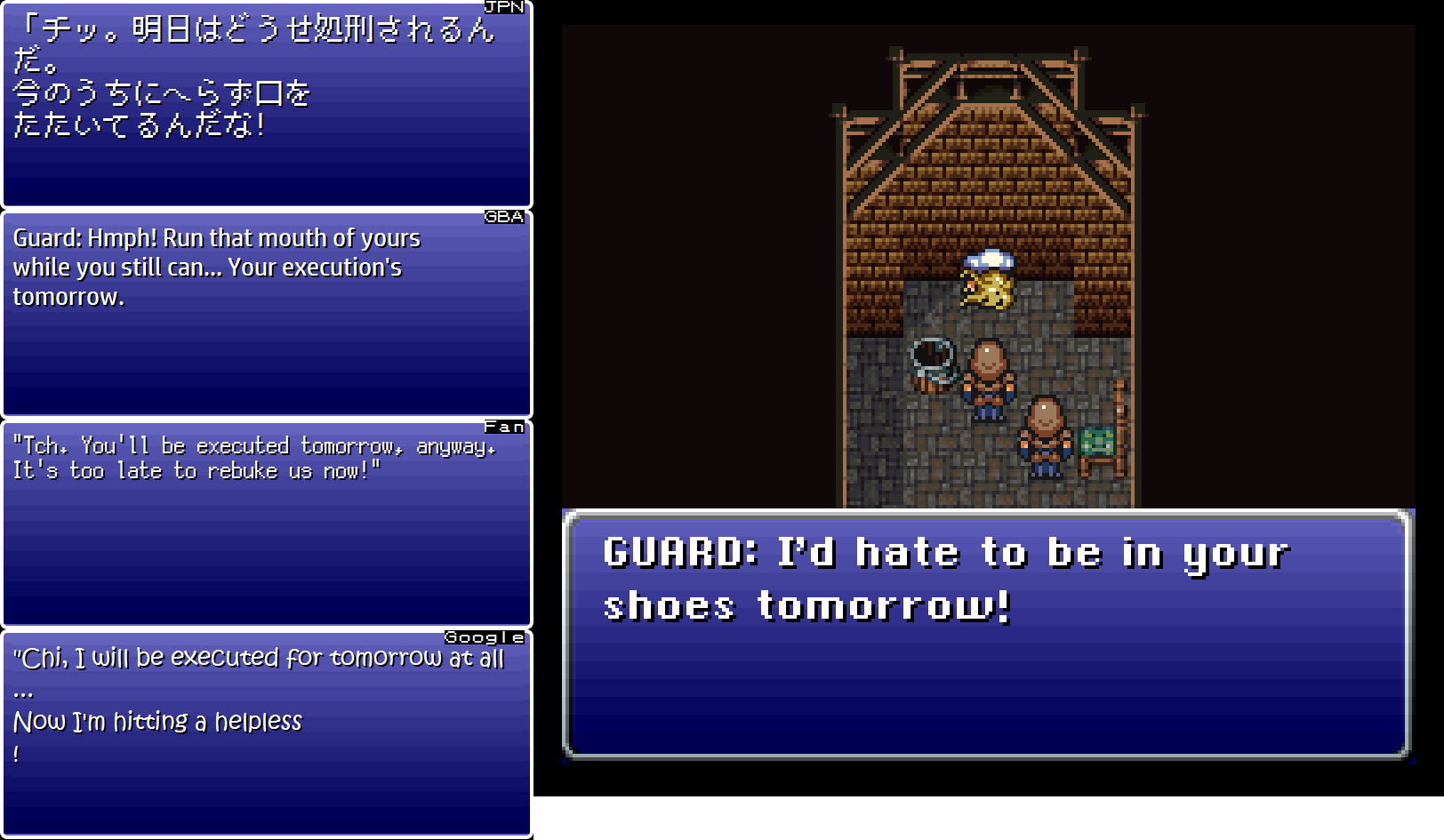
After a guard beats Celes, he says in Japanese: “Tch. You’re gonna get executed tomorrow anyway.”
The Super NES translator had to dance around this mention of killing, so the line became: “I’d hate to be in your shoes tomorrow!”
Saved by the Merchant Locke
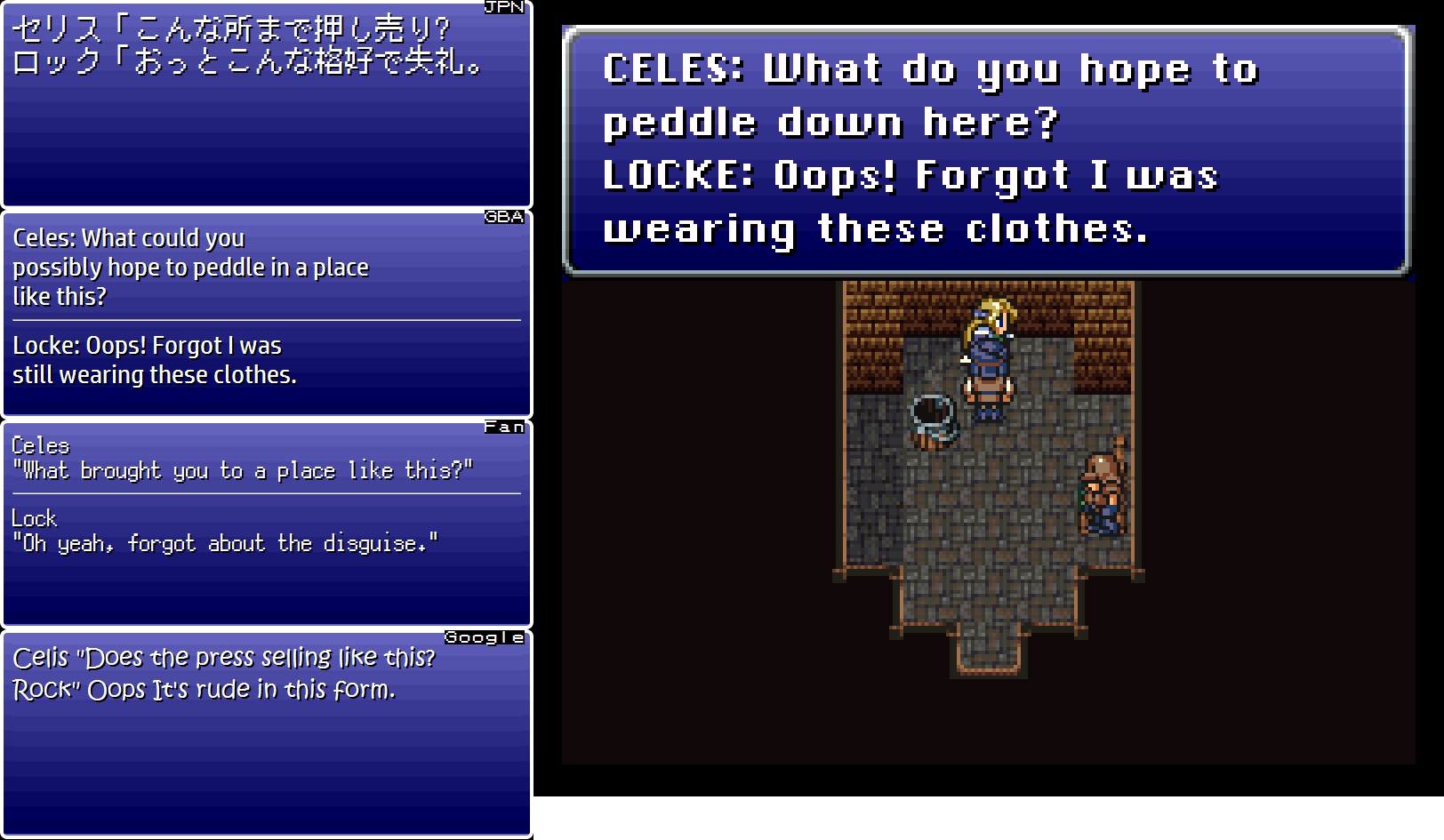
Locke sneaks in and saves Celes. Depending on the outfit he’s wearing, Celes has a slightly different line after being saved. We can see in this example that the fan translation removes this content, though.
The Broken General
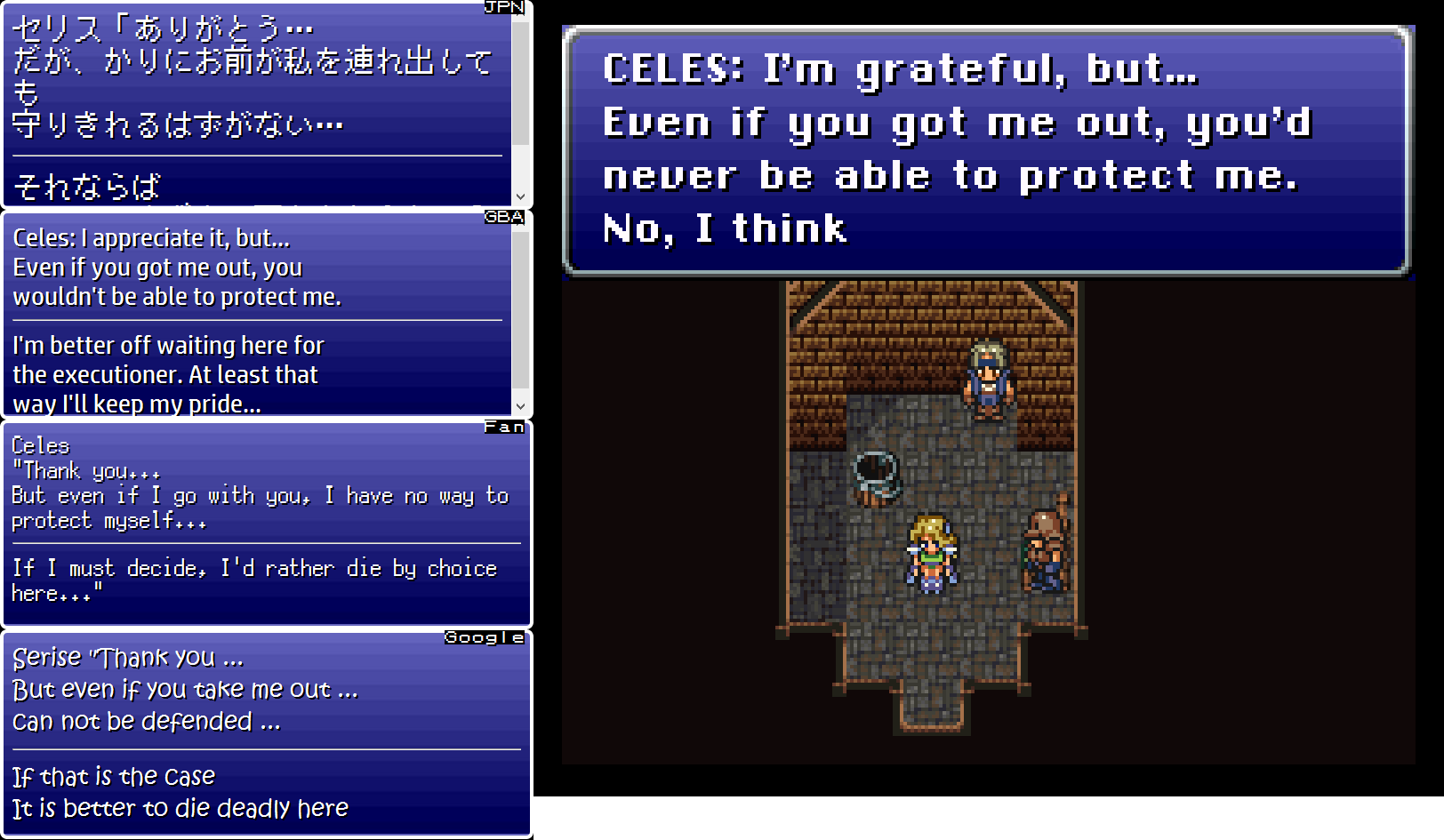
Celes has had her spirit broken and is pretty much ready to die. So when Locke tries to help her escape, she comes up with excuses to stay a prisoner. In Japanese, one of these excuses is: “Even if you did get me out of here, there’s no way you’d be able to fully protect me…”
The Super NES translation and GBA translation get this right. But the fan translator didn’t fill in the blanks properly, so who’s talking about who gets all jumbled up and results in a faulty translation.
Dreamin’ About Food
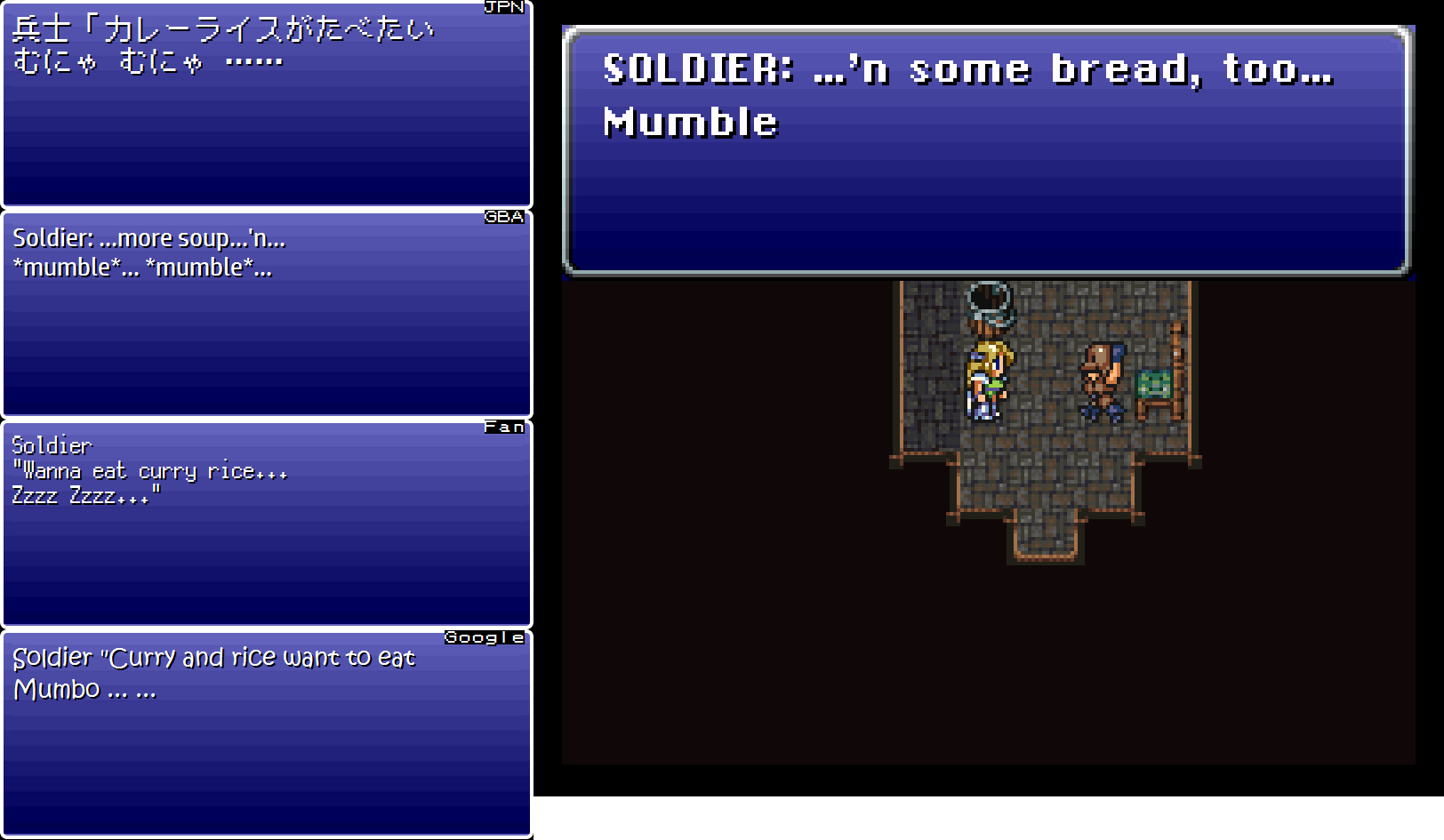
A guard was supposed to keep watch, but he instantly fell asleep. The guard mumbles about food in his sleep – in Japanese, he mentions that he wants to eat “curry rice”, which is a wonderfully delicious Japanese food that’s basically a spicy stew served with rice:

Curry rice is also often associated with the Japanese military – particularly the navy. You can even buy “navy curry”:

In the Super NES translation, this Japanese food was replaced with “bread”. In the GBA translation, it mentions “soup”. The fan translation retains the original Japanese food.
Beware the Meme-bers
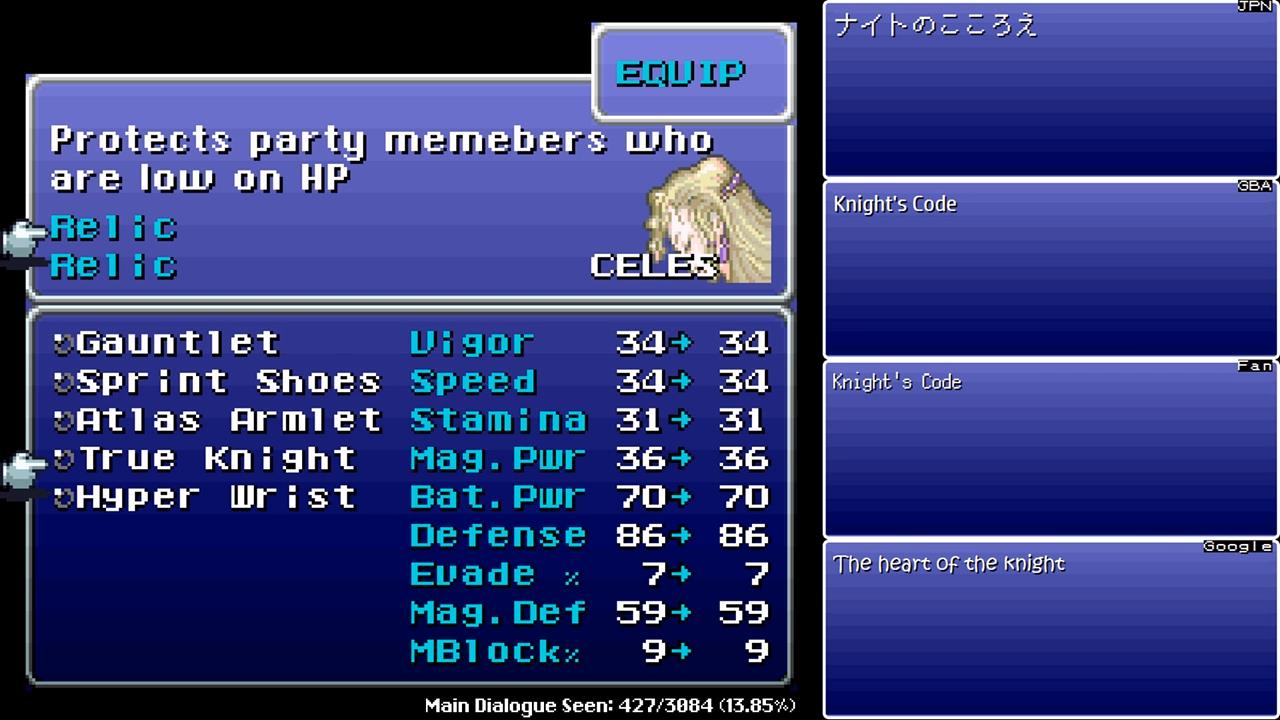
I almost missed it again, but there’s a typo in this item’s description. There must be something about this font that makes it easy to miss typos.
Problematic Plurals
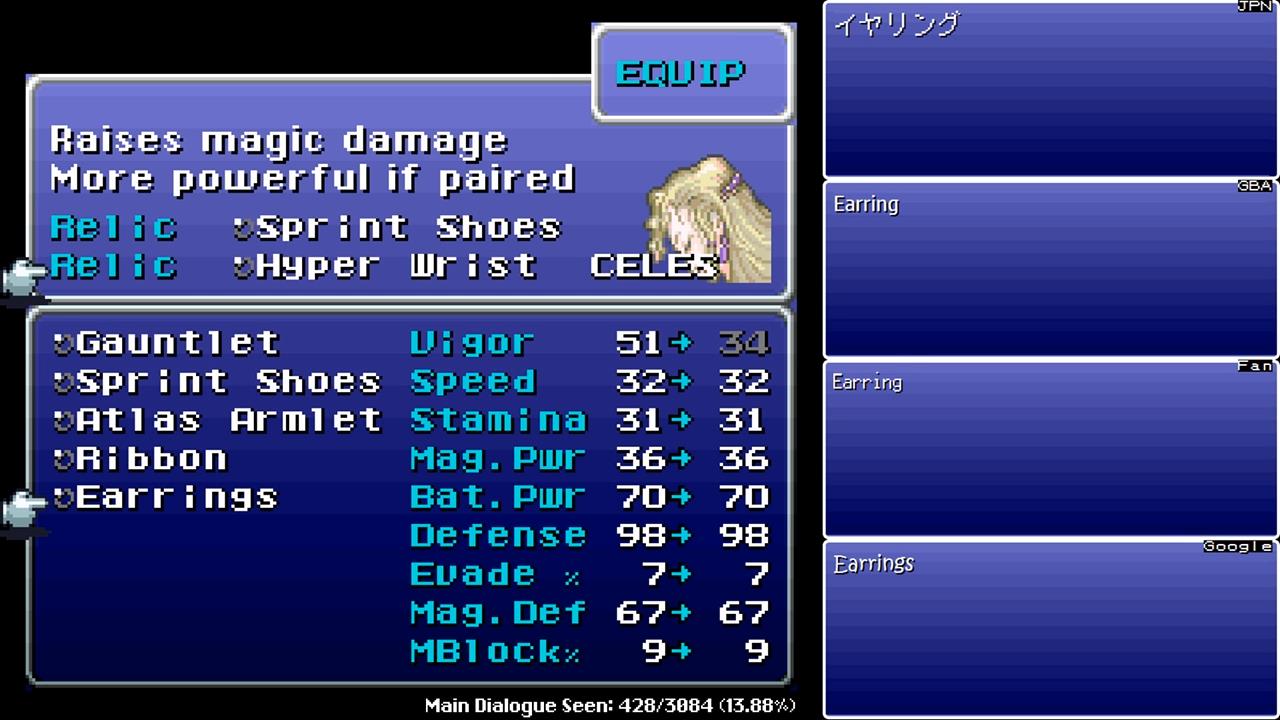
This accessory/relic is translated as “Earrings” in the Super NES translation, and its description says “more powerful if paired”. But wait, if it’s “Earrings”, then there’s already more than one. So then that implies that if you equip two of these, you’ll be wearing at least four earrings. And it looks like Celes here already has earrings on… It’d be kind of funny to see her wearing six earrings at once.
The Japanese language doesn’t make a strong distinction between singular and plural forms of nouns, so given the above silliness, I’m guessing this was meant to be a single earring all along. The GBA and fan translations follow this train of thought, while the machine translation probably takes a random guess without any consideration for context.
Instructions from Opposite World
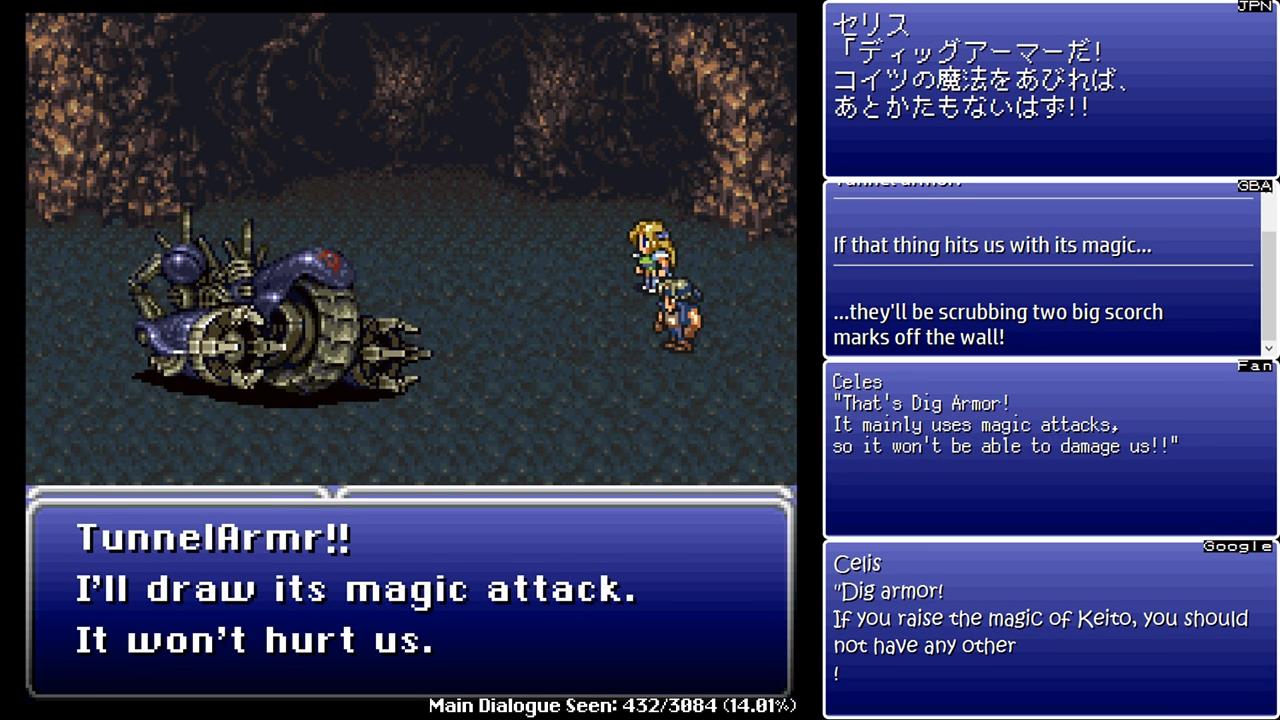
Just as Locke and Celes are about to successfully complete their escape, a giant Imperial machine blocks the way. It apparently uses powerful magic, so Celes says in Japanese: “Dig Armor! If we get hit by this thing’s magic, there won’t be a trace of us left!”
The Super NES translation replaces this line about how dangerous the machine is with exact instructions on what to do in this battle. But the weird thing is, at least one or two other explanations follow this part in the Japanese script anyway. As a result, the Super NES script gets really repetitive and had me saying, “Come on already, I get it!”
The fan translation gets this line absolutely wrong, though: “That’s Dig Armor! It mainly uses magic attacks, so it won’t be able to damage us!” That’s literally the exact opposite of what’s being said in the Japanese script.
Also, as a side note, we had a good laugh when we noticed the machine translation sometimes calls this thing “Digg Armor”. I wonder if the phrase “read it” has ever been mistranslated as “Reddit” in the history of translation.
This Grass is Too Dang High
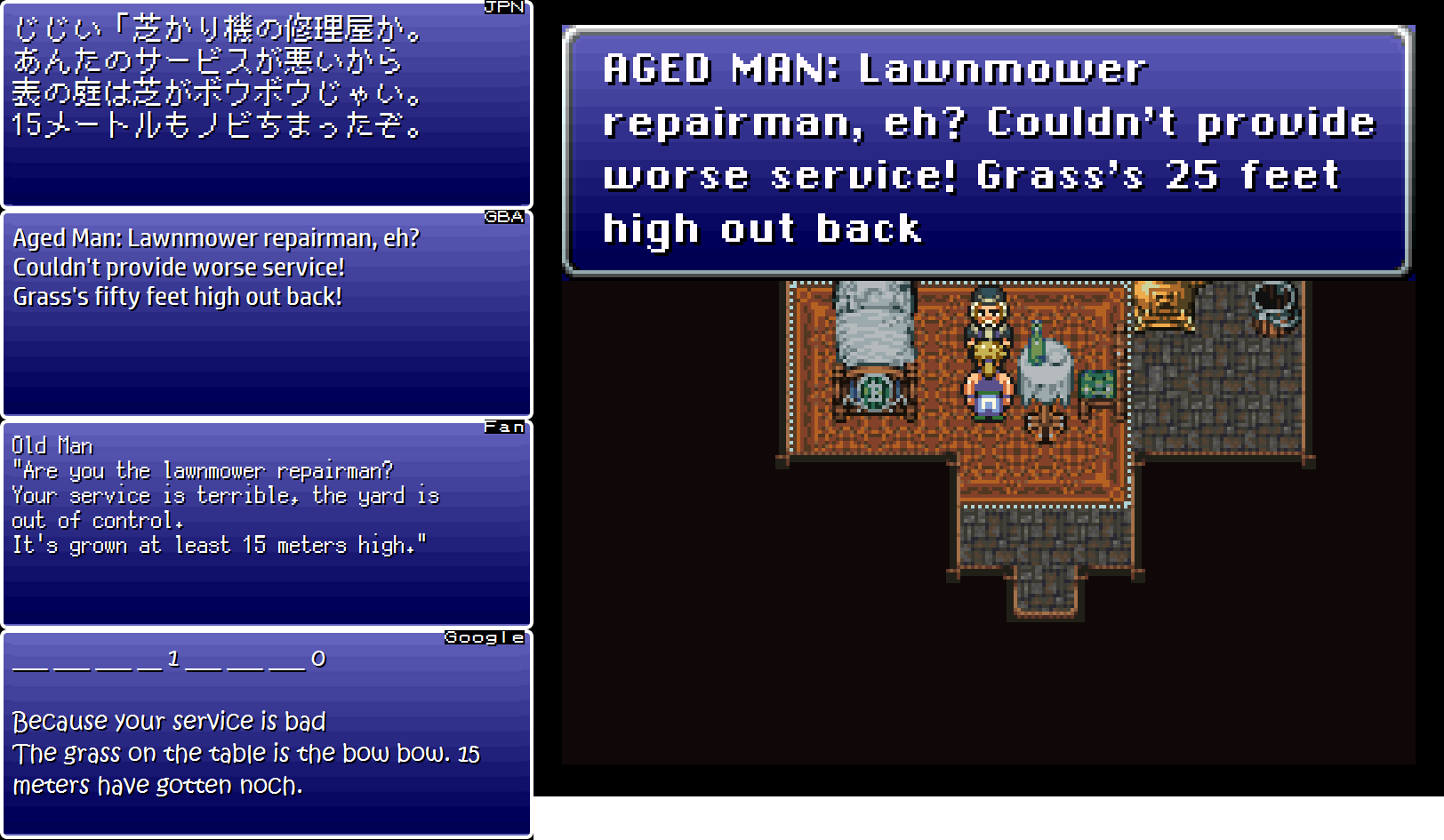
We begin Sabin’s scenario now. He washes up on a distant shore and finds the home of a weird old man. At one point, the old man mistakes Sabin for a lawnmower repairman and complains about how tall the grass has grown outside. In the Japanese script, the grass has grown 15 meters high.
America isn’t as metric-happy as the rest of the world, so this was replaced with “25 feet high” in the Super NES translation. The GBA translator stopped to do actual unit conversion, though, and changed the line to the more accurate “50 feet high”:

The fan translation and machine translation leave the original metric measurement the same.
Neither a Suplex Nor a Meteo
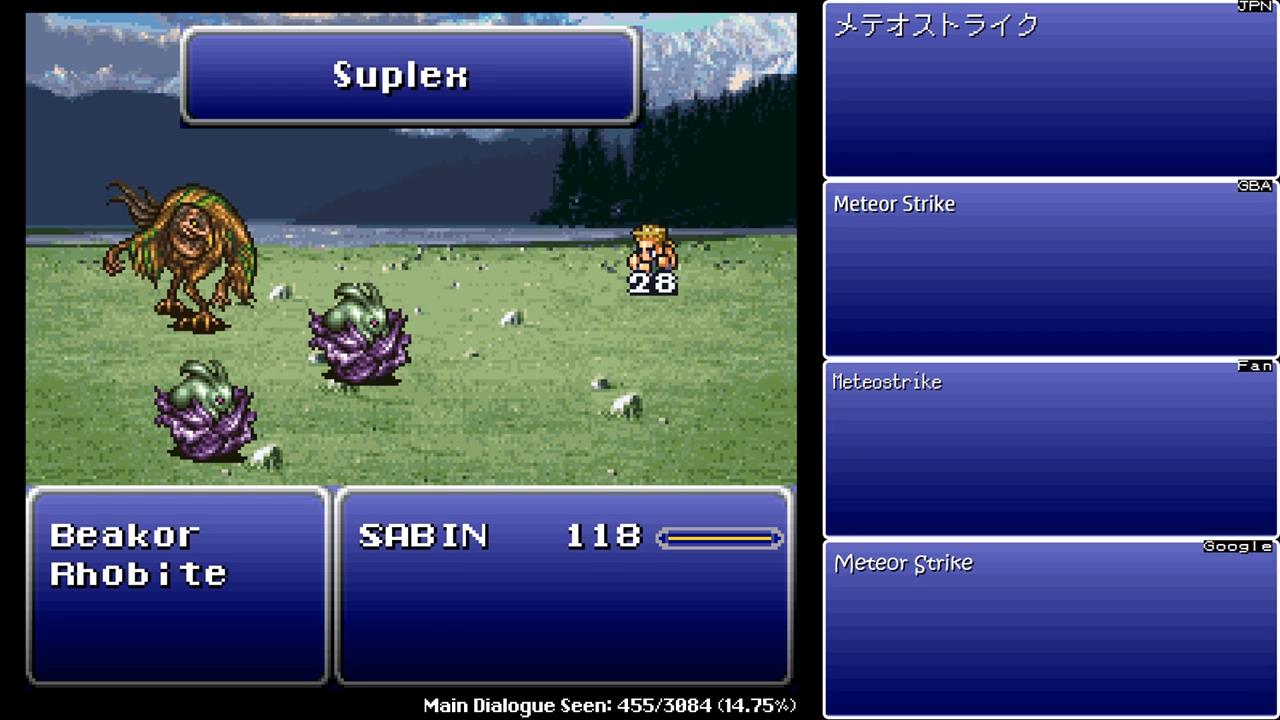
English-speaking fans love Sabin’s “Suplex” attack, especially when you get to suplex a ghost train later on.
In the Japanese version, this attack is actually called メテオストライク (meteo sutoraiku). If you’re an old Final Fantasy fan, it might be exciting to see “Meteo” referred to here, but that’s actually just how the word “meteor” is spelled in Japanese. The cool-sounding “Meteo” spell from earlier games was supposed to be plain ol’ “Meteor” all along.
As we can see, the GBA translation and the machine translation recognize this “meteo in Japanese is actually meteor in English” thing, while the fan translation doesn’t seem to make the same realization.





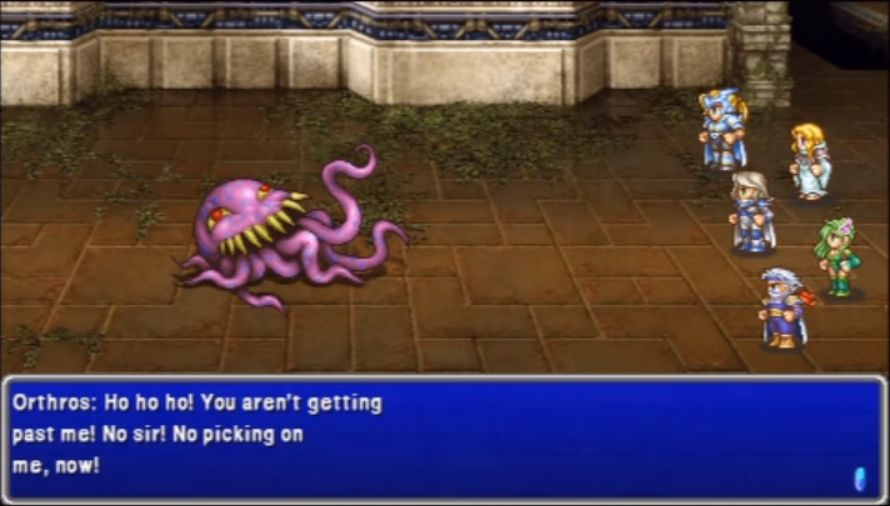
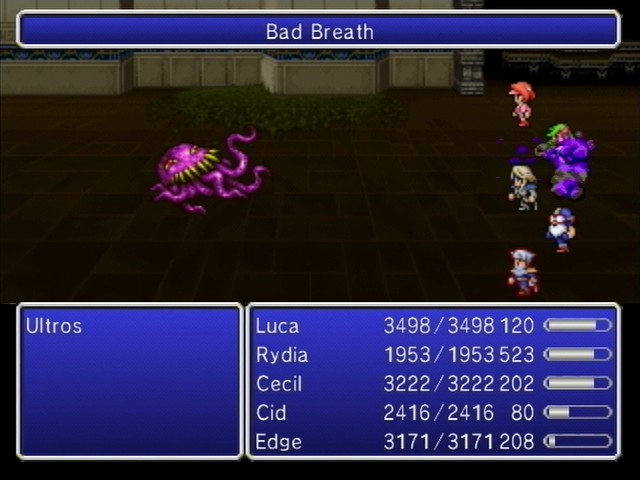
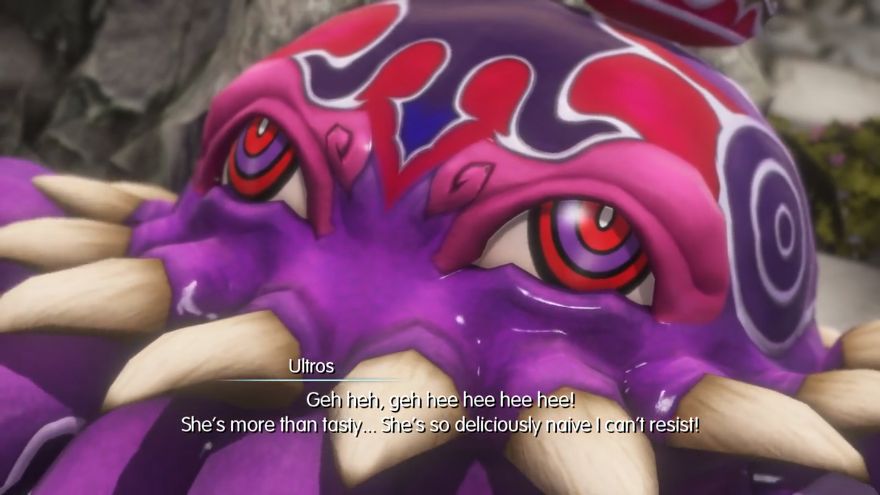
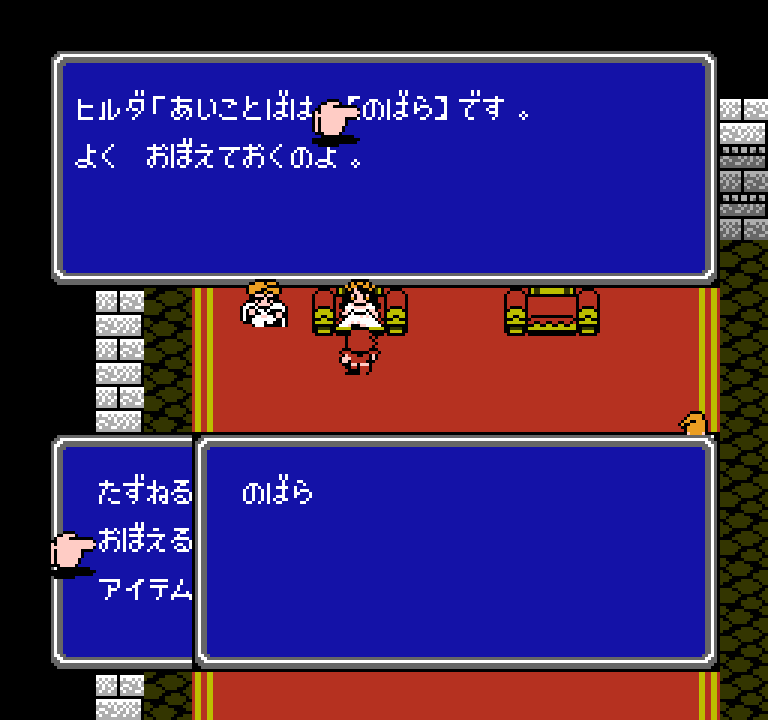
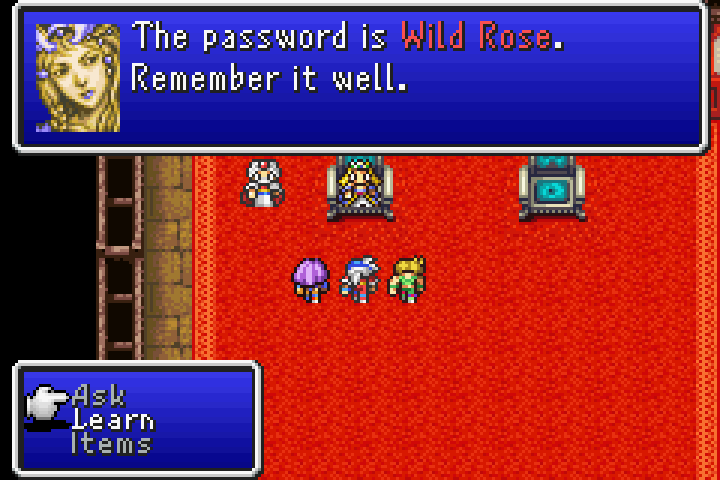
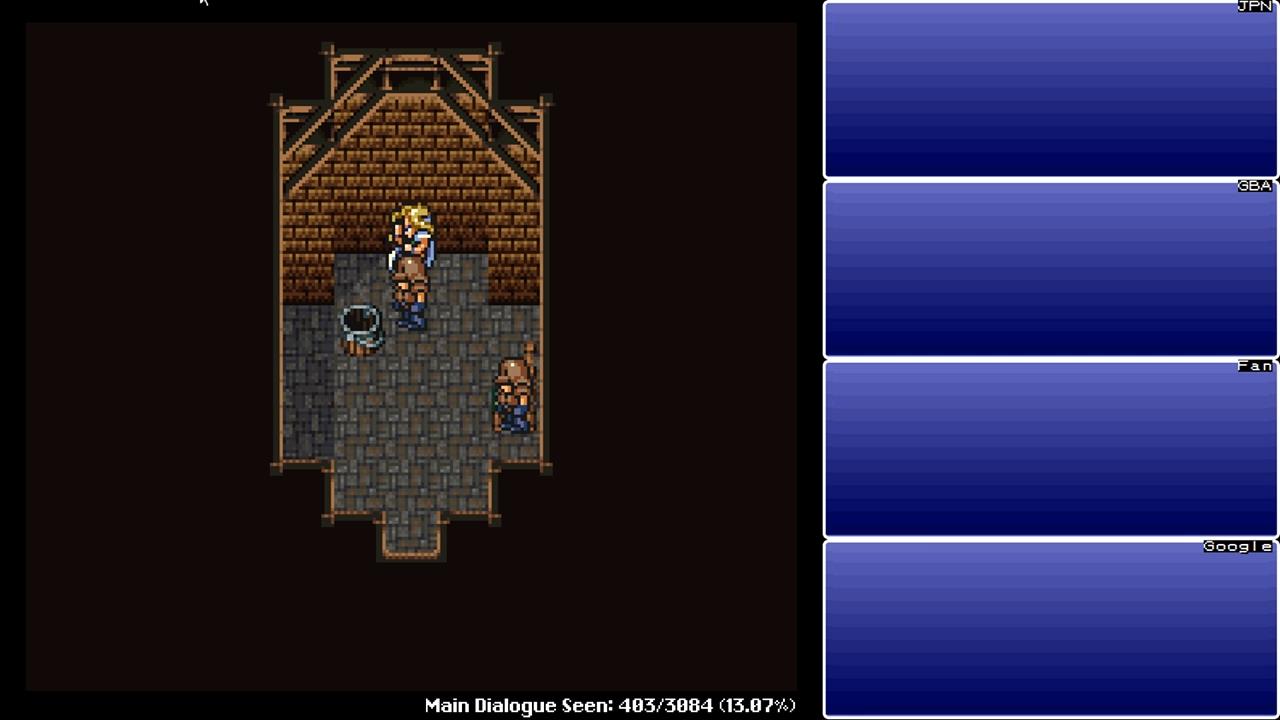
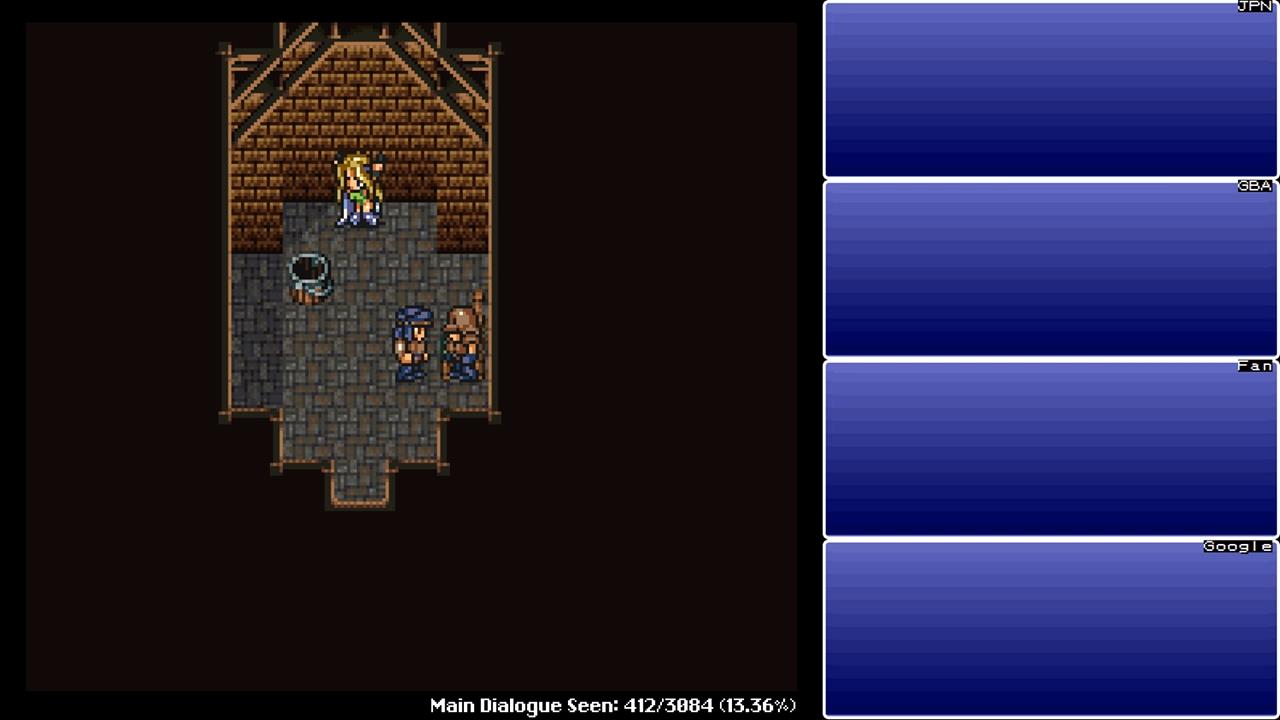
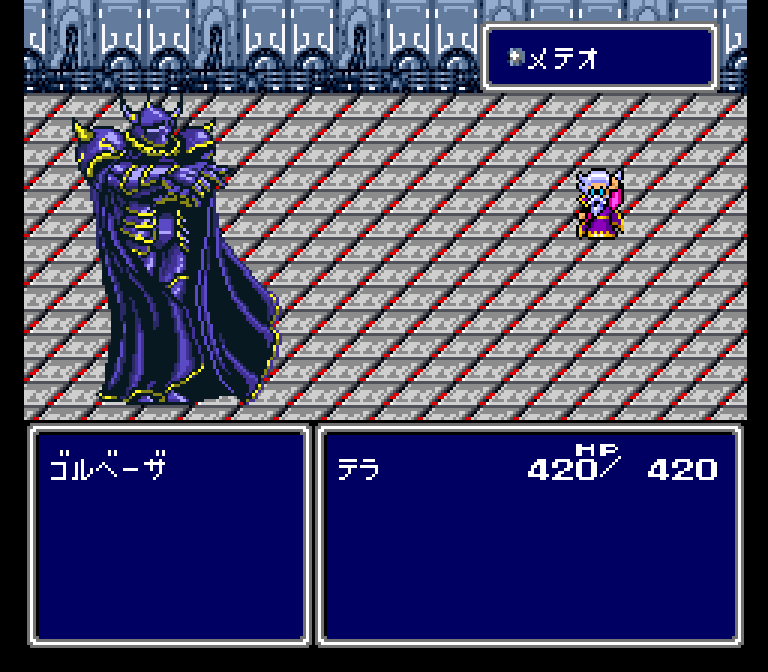
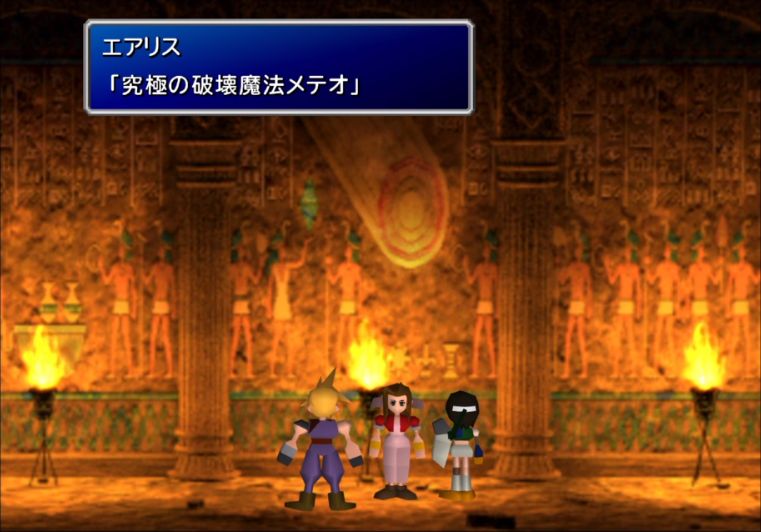
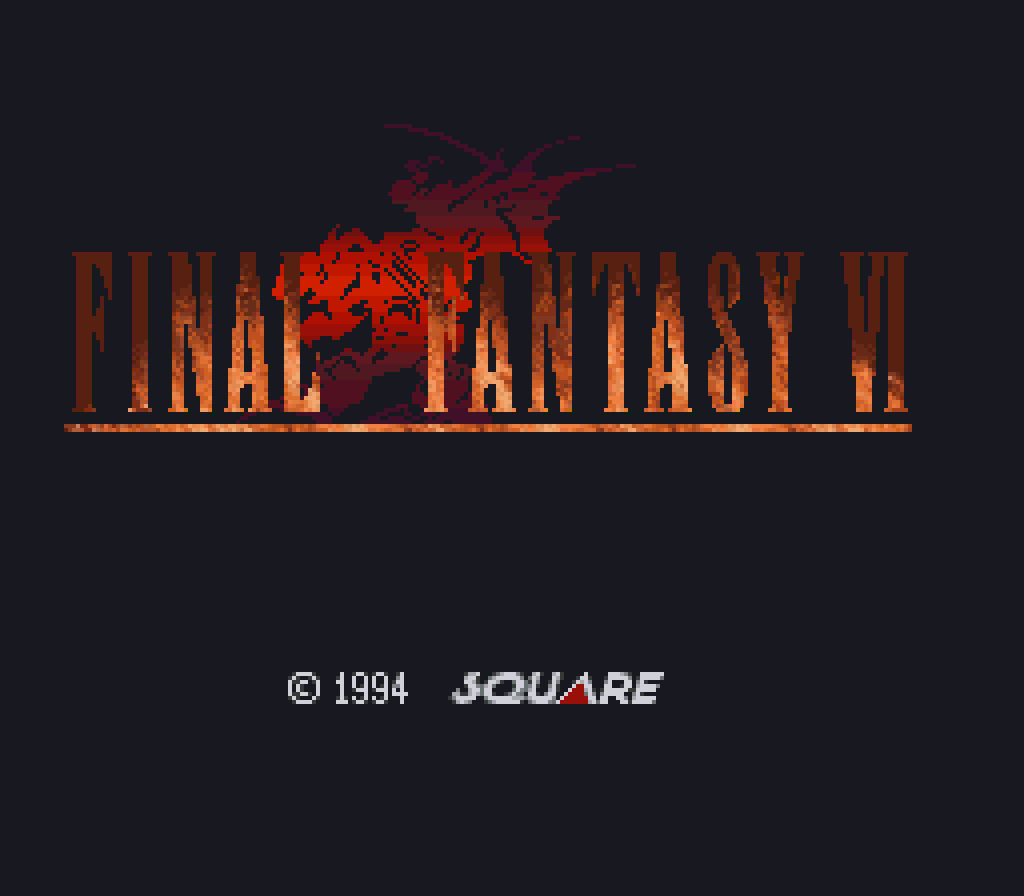
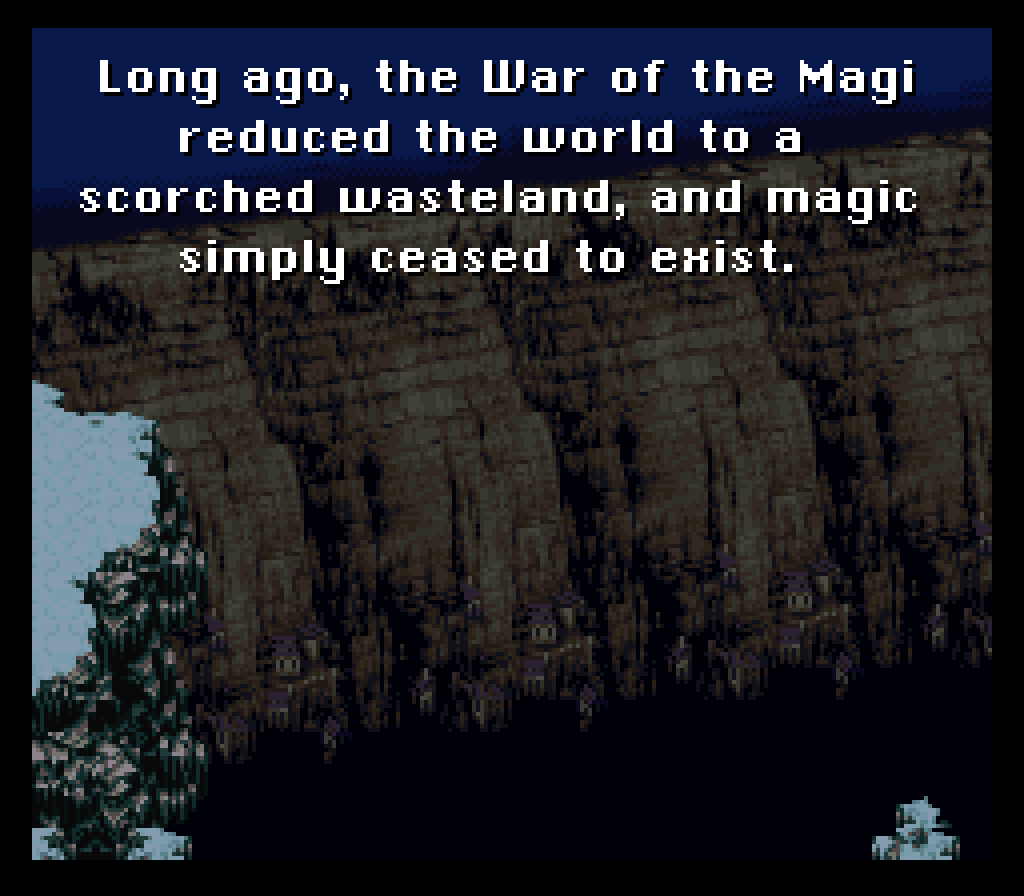
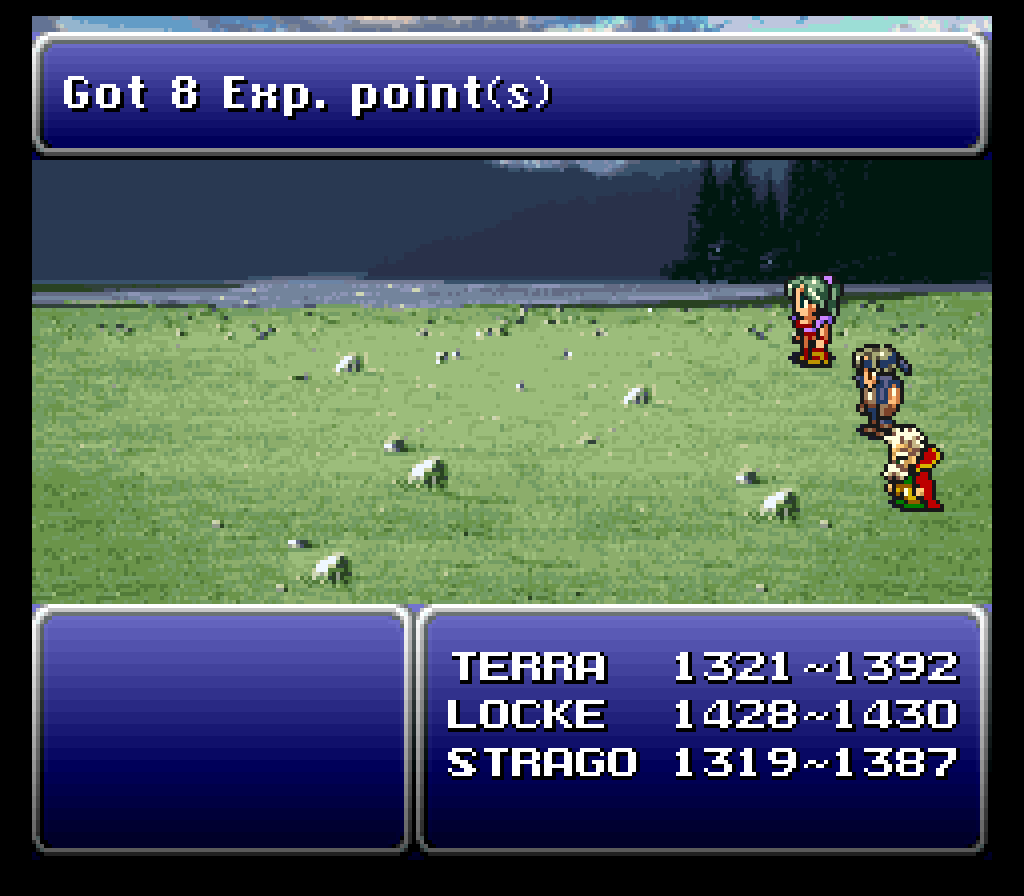
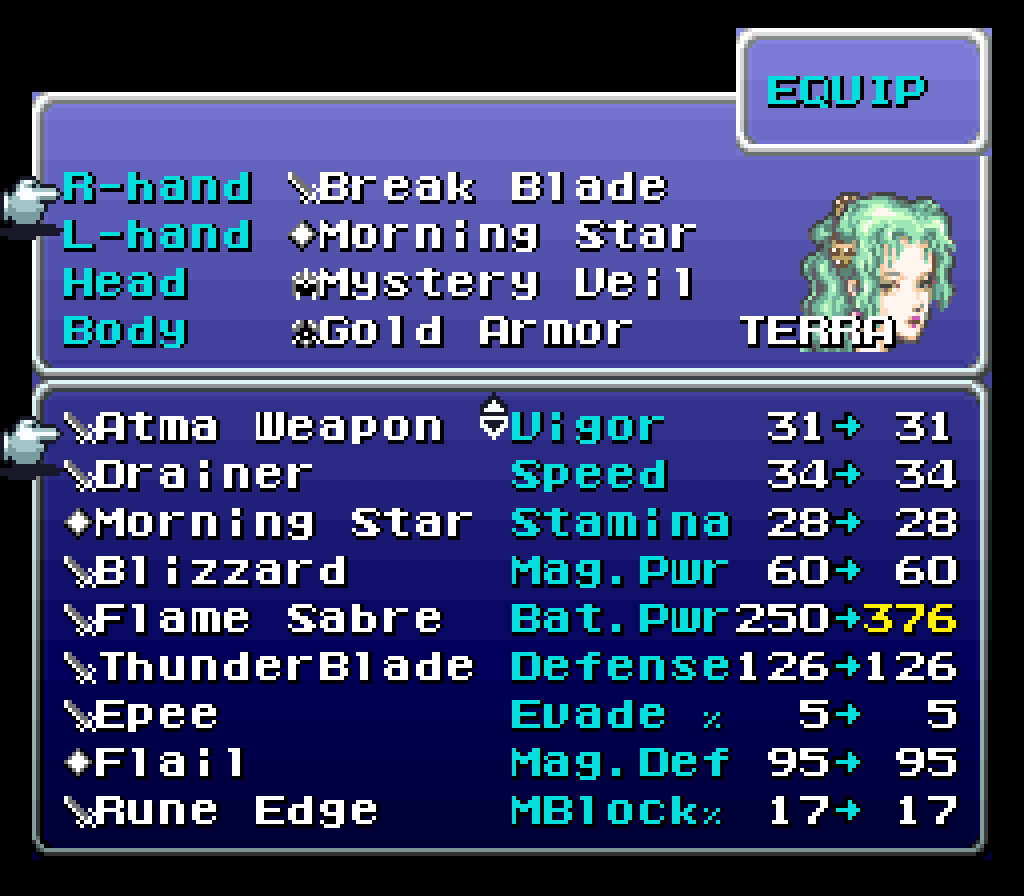
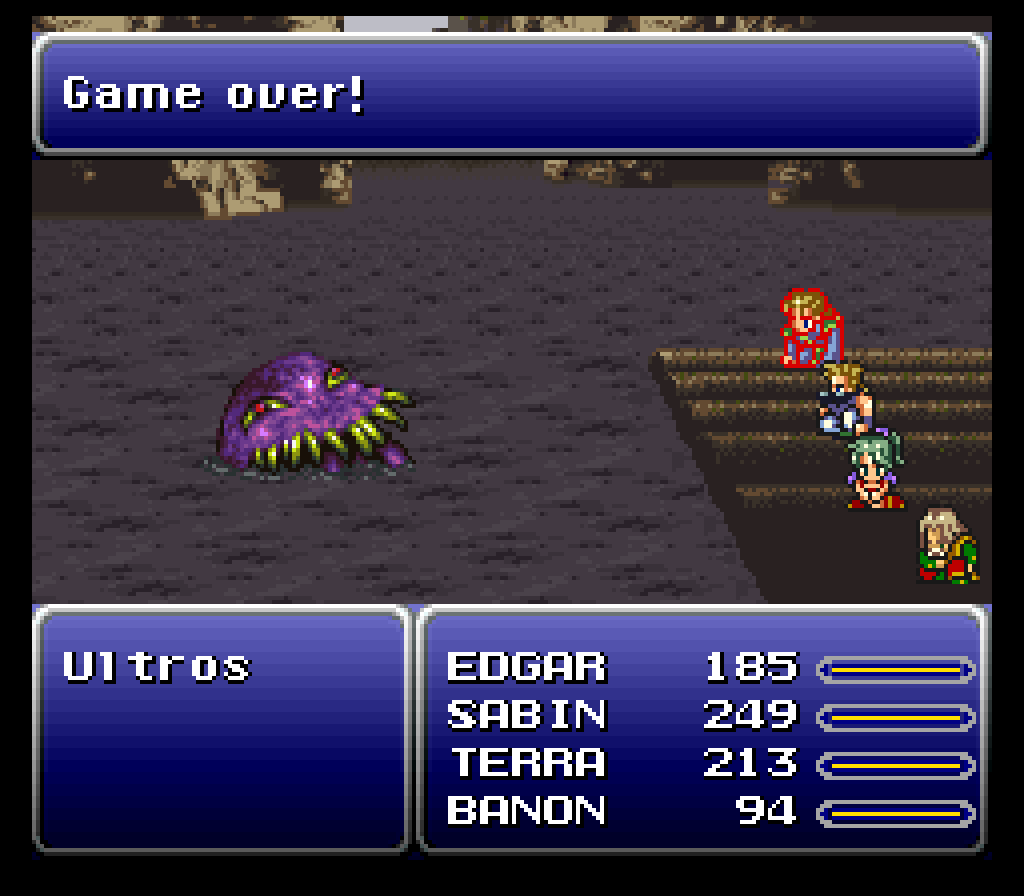
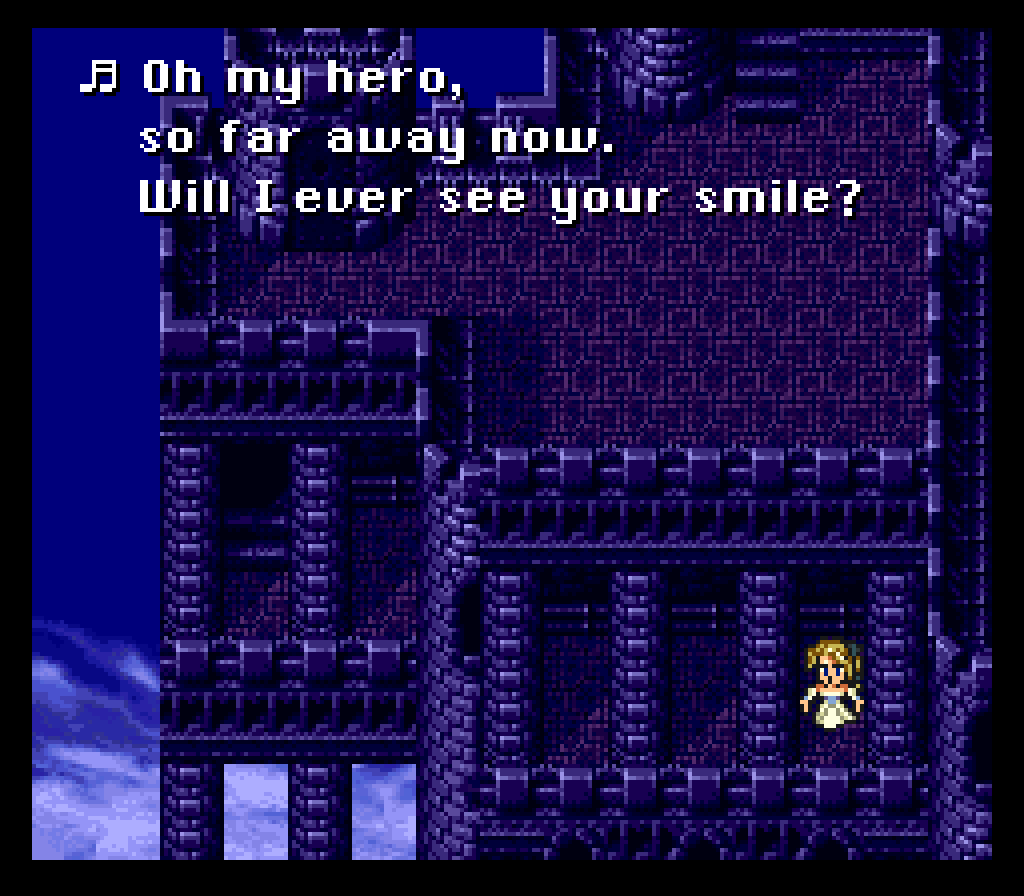
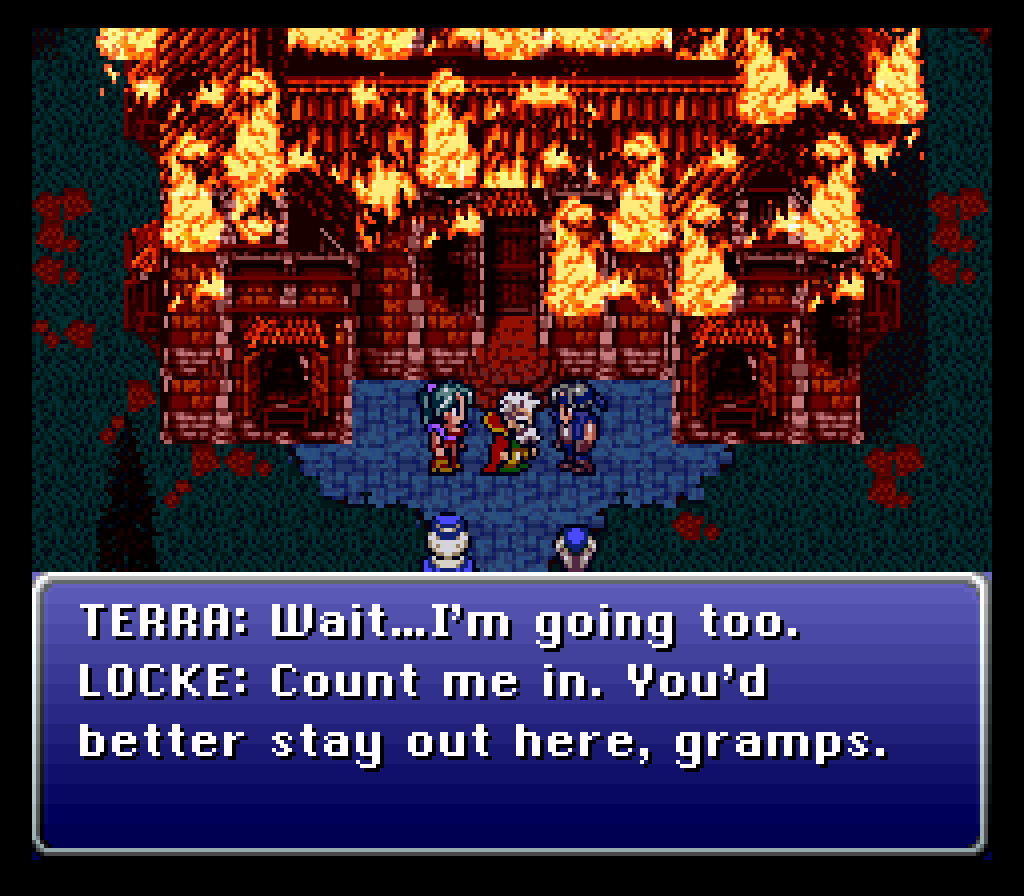
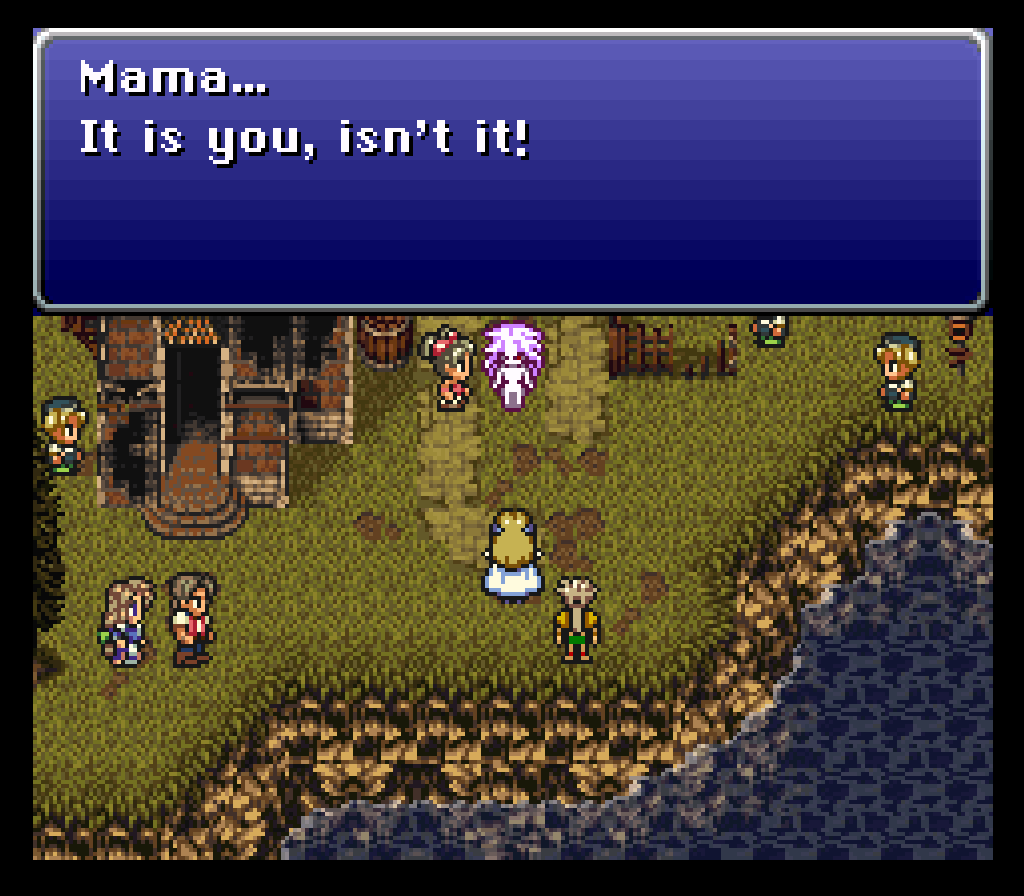
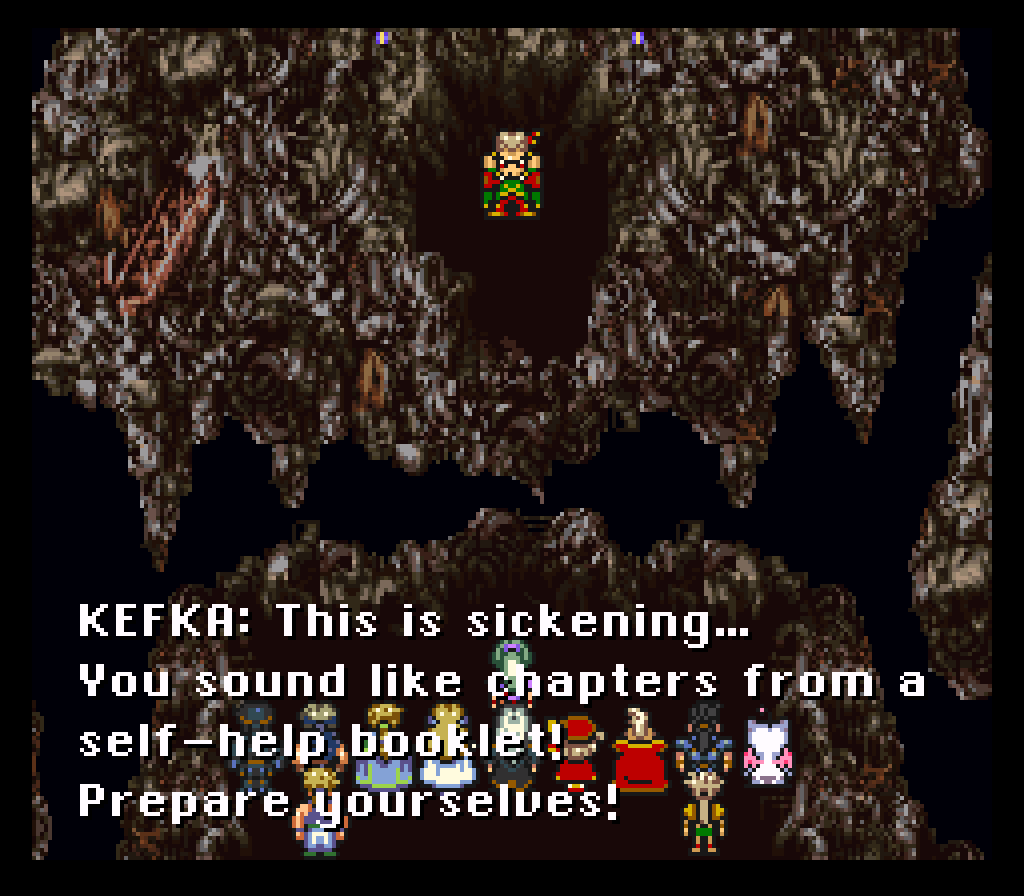
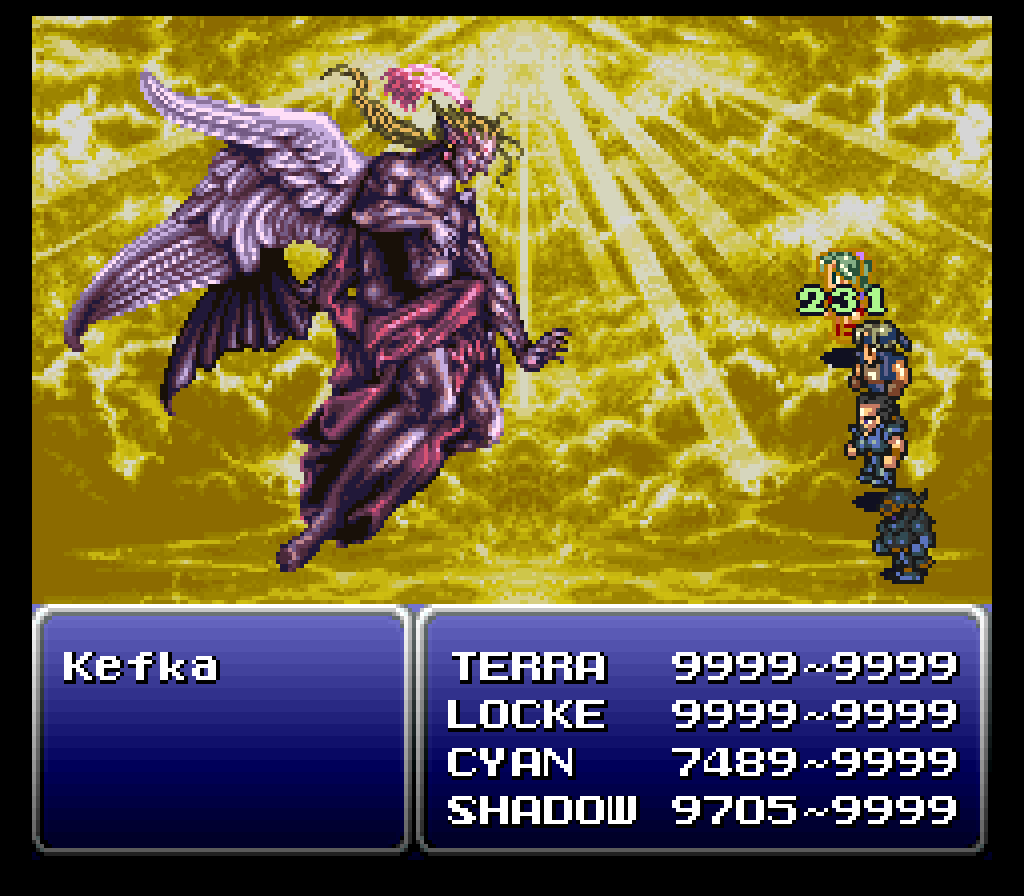
![press start to translate [Final Fantasy IV] press start to translate [Final Fantasy IV]](https://legendsoflocalization.com/wp-content/uploads/2019/08/bbenma.png)
I think you mistook Theatrhythm for Record Keeper in your Ultros/Orthros comparison section (in the picture description). I’d also like to say you’re doing fantastic work here. Translation comparisons always interest me, and as an aspiring J-to-E translator, I think there’s much to learn from this series of yours. Keep it up!
Haha, thanks – it looks like I actually named the file with FFRK, so it’s so weird that I called it Theatrhythm instead. I need my Wisdom stat up!
It makes perfect sense to me that こうげき would get translated as “skill”. It obviously means “attack”, and in video games, named attacks are called “skills”.
I’ve seen a lot of characters who were perverted in the original Japanese release get toned down for the West. But I think Ultros is the only example I’ve seen of a character getting perved UP in the translation! That GBA version is very… questionable. But the Japanese version just wants Senpai to notice him.
(I think I like the Japanese version better; it’s way funnier that way.)
Can confirm that curry rice is delicious, and it’s easy to make (It’s a basic soup with sauteed onions, then a spice roux added at the end) and doesn’t require any special ingredients. The navy association is due to it being introduced to Japan via British navy rations (which is also why it’s so distinct from Indian curry).
Anyone here able to comment on how the European translations handled the rhyme for stealing clothes?
The original version of Final Fantasy VI was never released in Europe, but there’s still the re-releases. Unfortunately, I’m not a Final Fantasy expert.
I looked it all up! As it turns out, only the German version also bothered with the rhyme. French and Italian (as far as I can tell anyway, I don’t speak Italian) just translate the English, and Spanish makes up its own thing entirely. In detail:
– For the merchant’s clothes:
German: Ein bisschen klein, doch im Grunde fein! (A little bit small, but basically fine!)
French: Ils sont un peu trop justes, mais le prix me convient ! (They’re a little tight, but I’m fine with the price!)
Italian: Sono un po’ piccoli, ma ne è comunque valsa la pena! (They’re a bit small, but it was still worth it!)
Spanish: Vaya, no es de mi estilo… ¡Si parezco Alí Babá! (Well, that’s not my style… I look like Ali Baba!)
– For the soldier’s clothes:
German: Ein bisschen groß, doch kein hartes Los! (A little bit large, but no big deal!)
French: Ils sont un peu trop grands, mais le prix me convient ! (They’re a little large, but I’m fine with the price!)
Italian: Sono un po’ grandi, ma non fa nulla! (They’re a bit large, but that’s alright!)
Spanish: Madre mía, ¿cuánto hace que no lavas esto? (Good grief, when did you last wash those?)
About Trance/Morph:
Trance’s duration is based on the amount of AP (magic points) that Terra gains after each battle. After each battle, she gains 2 “Trance counters” for each AP earned, for a maximum of 255. (For instance, if she gets 4 AP after battle, she’d get 8 Trance Counters.) After Terra uses Trance, the Trance counter ticks down until the battle ends or she reverts.
Also, not every battle gives out AP. Most of the battles that don’t give out AP come before the player gains magic, but some bosses such as Deathgaze and the Master Tonberry don’t give any AP. Also, the GBA bonus dungeon Dragon’s Den doesn’t give out any AP, so you have to plan out your Trance uses carefully in that dungeon.
The SNES, GBA, and fan translations are all somewhat vague, since Square didn’t want to go into technical jargon. If anything, I prefer the SNES and GBA translations since they’re more straightforward. The fan translation hints at Trance’s duration gauge, but ends up making things sound messier.
Celes torture change:
The FF6 Advance translator, Tom Slattery (who also worked on the FF4 DS translation) stated the change was due to CERO, and that the whole bit about recent crimes in Japan was just a baseless rumor.
https://archive.rpgamer.com/features/insidegaming/tslatteryint.html (3rd question under FF6 Advance section)
About Ultros VS Orthros and the Rosebud VS Wild Rose:
The GBA re-release of FF1, Dawn of Souls, also calls him “Orthros.” It was a bit jarring to see a more literal translation for FF1 Advance, only to go back to Ultros for FF6 Advance. I feel like they should’ve just stuck with “Ultros” for all future translations for consistency and nostalgia’s sake.
I’m also surprised that FF6 Advance didn’t change “Rose bud” back to “Wild Rose”, since FF2 had already been released multiple times in the West, and it would’ve been a nice tie-in.
Finally, I’m surprised you didn’t mention that the desperation attacks are Final Fantasy’s first version of Limit Breaks.
Nice work, can’t wait for part 4.
Whoaaa, thanks for all these details & info! That clears up lots of stuff for me!
For Ultros/Orthros, the screencap you labeled as Theatrhythm is actually from the mobile game Final Fantasy Record Keeper! I booted up my copies of both Theatrhythm games to check them, and they both call him Ultros.
And speaking of FFRK, I checked that one out too, and turns out it actually uses both! The story dungeon descriptions all call him Ultros, but the summon ability and the limited-time events all seem to use Orthros (including the multiplayer event you posted a screencap of).
Photo proof here: https://imgur.com/a/Il1wVPE
Course, I spent so long taking screencaps that by the time I posted this the Theatrhythm/FFRK mixup was already fixed. 🙂
“Can not be helped”
“But look at this boy, he’s even prettier!”
Ultros understands that cute is cute, gender or sex be damned.
Hey, in the scene where Locke saves Celes, if he’s wearing the soldier outfit, she says, “aren’t you a little short for a soldier?” referencing Stars Wars. Is that a Woolseyism or is it in the original?
There are other more overt Star Wars references, so I wonder just how much Star Wars did the original developers have in mind.
The line is the same in Japanese, and Japanese fans seem to believe it’s a reference in the Japanese script too: more info in Japanese
I’m glad someone asked this. I was curious if it made the same reference in the Japanese version.
I as thinking, something they could’ve done to still have the kid hint that you need to dress like a merchant without the possibly strange ‘only people dressed like merchants’ phrasing is have him say something like:
‘I’m only supposed to let merchants through, and you don’t look like a merchant…’
I dunno, maybe it only makes more sense to me since I thought of it…I just feel like it sounds more natural than the kid being told to only let people dressed like merchants through.
Great work. I’m really enjoying this series having just played through ff6 in Japanese myself.
I thought it was interesting that you disagreed with the genetic engineering in Celesc intro in the snes translation. I read something similar into it myself. The 「人工的にうみだされた」gave me the feeling something unnatural was done to her.
I think that the lack of kanji for うむ makes it ambiguous. If it were 産む, that would cement the idea that Celes was engineered in some way. 生む wouldn’t shut down that line of thinking, but it would leave the door open to the idea of Celes just receiving some sort of training fir the gifted.
The changes made to the scene where Celes is in the dungeon are really interesting to me! I don’t know the exact CERO guidelines for depicting violence, but CERO wasn’t established until 2002, well after the SNES release, but before the GBA release. The only case I can think of that matches what you said (and which would be relevant to the scene in question) is the murder of Junko Furuta, which occurred in 1989. I don’t recommend looking up details, but the victim was locked in a basement and tortured by a group of teenage boys. Even though it happened years before FFVI’s initial release, I wouldn’t be surprised if CERO had it in mind when writing up their guidelines in 2002, or revising them in 2006, given its shocking brutality and enduring cultural impact.
Ultros also appears in Final Fantasy XII as Orthros, as a mark. The drawing shown upon looking at the individual posting on the hunts board even resembles his original Final Fantasy VI sprite!
Pretty cool read! I’m going to keep going, see if anything is mentioned about Intagir using Meteo.
Some enemies don’t give AP, particularly a few that are encountered at the very beginning of the game. You can still run into them on the Veldt.